#it is fun to play with myth backstory
Explore tagged Tumblr posts
Text
An essay on Furiosa, the politics of the Wasteland, Arthurian literature and realistic vs. formalistic CGI

Mad Max: Fury Road absolutely enraptured me when it came out nearly a decade ago, and I will cop to seeing it four times at the theatre. For me (and many others who saw the light of George Miller) it set new standards for action filmmaking, storytelling and worldbuilding, and I could pop in its Blu Ray at any time and never get tired of it. Perhaps not surprisingly, I was deeply apprehensive about the announced prequel for Fury Road's actual main character, Furiosa, even if Miller was still writing and directing. We didn't need backstory for Furiosa—hell, Fury Road is told in such a way that NOTHING in it requires explicit backstory. And since it focuses on the Yung Furiosa, it meant Charlize Theron couldn't return with another career-defining performance. Plus, look at all that CGI in the trailer, it can't be as good as Fury Road.
Turns out I was silly to doubt George Miller, M.D., A.O., writer and director of Babe: Pig in the City and Happy Feet One & Two.
Furiosa: A Mad Max Saga is excellent, and I needn't have worried about it not being as good as Fury Road because it is not remotely trying to be Fury Road. Fury Road is a lean, mean machine with no fat on it, nothing extraneous, operating with constant forward momentum and only occasionally letting up to let you breathe a little; Furiosa is a classical epic, sprawling in scope, scale and structure, and more than happy to let the audience simmer in a quiet, almost painfully still moment. If its opening spoken word sequence by that Gandalf of the Wastes himself, the First History Man, didn't already clue you in, it unfolds like something out of myth, a tale told over and over again and whose possible embellishments are called attention to in the dialogue itself. Where Fury Road scratched the action nerd itch in my head like you wouldn't believe, Furiosa was the equivalent of Miller giving the undulating folds of my English major brain a deep tissue massage. That's great! I, for one, love when sequels/prequels endeavour to be fundamentally different movies from what they're succeeding/preceding, operating in different modes, formats and even genres, and more filmmakers should aim for it when building on an existing series.
This movie has been on my mind so much in the past week that I've ended up dedicating several cognitive processes to keeping track of all of the different ponderings it's spawned. Thankfully, Furiosa is divided into chapters (fun fact: putting chapter cards in your movie is a quick way to my heart), so it only seems fitting that I break up all of these cascading thoughts accordingly.
1. The Pole of Inaccessibility
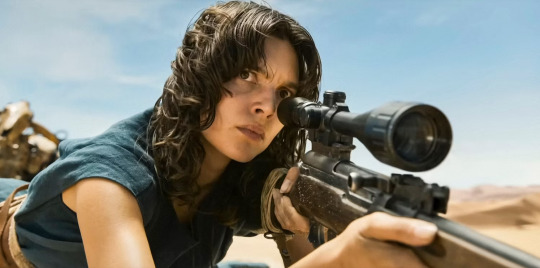
Furiosa herself actually isn't the protagonist for the first chapter of her own movie, instead occupying the role of a (very crafty and resourceful) damsel in distress for those initial 30-40 minutes. The real hero of the opening act, which plays out like a game of cat and mouse, is Furiosa's mother Mary Jabassa, who rides out into the wasteland first on horseback and then astride a motorcycle to track down the band of raiders that has stolen away her daughter. Mary's brought to life by Miller and Nico Lathouris' economical writing and a magnetic performance by newcomer Charlee Fraser, who radiates so much screen presence in such relatively little time and with one of those instant "who is SHE??" faces. She doesn't have many lines, but who needs them when Fraser can convey volumes about Mary with just a flash of her eyes or the effortless way she swaps out one of her motorcycle's wheels for another. To be quite candid, I'm not sure of the last time I fell in love with a character so quickly.
You notice a neat aesthetic contrast between mother and daughter in retrospect: Mary Jabassa darts into the desert barefoot, clad in a simple yet elegant dress, her wolf cut immaculate, only briefly disguising herself with the ugly armour of a raider she just sniped, and when she attacks it's almost with grace, like some Greek goddess set loose in the post-apocalyptic Aussie outback with just her wits and a bolt-action rifle; we track Furiosa's growth over the years by how much of her initially conventional beauty she has shed, quite literally in one case (hair buzzed, severed arm augmented with a chunky mechanical prosthesis, smeared in grease and dirt from head to toe, growling her lines at a lower octave), and by how she loses her mother's graceful approach to movement and violence, eventually carrying herself like a blunt instrument. Yet I have zero doubt the former raised the latter, both angels of different feathers but with the same steel and resolve. Of fucking course this woman is Furiosa's mother, and in the short time we know her we quickly understand exactly why Furiosa has the drive and morals she does without needing to resort to didactic exposition.
Anyway, I was tearing up by the end of the first chapter. Great start!
2. Lessons from the Wasteland
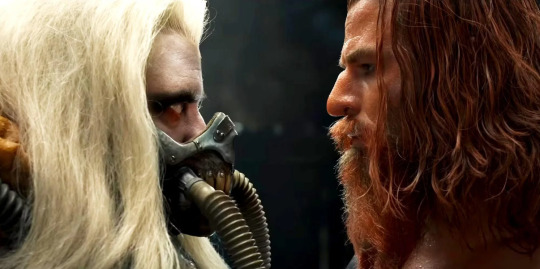
Most movies—most stories, really—don't actually tell the entire narrative from A to Z. Perhaps the real meat of the thing is found from H to T, and A-G or U-Z are unnecessary for conveying the key narrative and themes. So many prequels fail by insisting on telling the A-G part of the story, explaining how the hero earned a certain nickname or met their memorable sidekick—but if that stuff was actually interesting, they likely would have included it in the original work. The greatest thing a prequel can actually do is recontextualize, putting iconic characters or moments in a new light, allowing you to appreciate them from a different angle. All of season 2 of Fargo serves to explain why Molly Solverson's dad is appropriately wary when Lorne Malvo enters his diner for a SINGLE SCENE in the show's first season. David's arc from the Alien prequels Prometheus and Covenant—polarizing as those entries are—adds another layer to why Ash is so protective of the creature in the first movie. Andor gives you a sense of what it's like for a normal, non-Jedi person to live under the boot of the Empire and why so many of them would join up with the Rebel Alliance—or why they would desire to wear that boot, or even just crave the chance to lick it.
Furiosa is one of those rare great prequels because it makes us take a step back and consider the established world with a little more nuance, even if it's still all so absurd. In Fury Road, Immortan Joe is an awesome, endlessly quotable villain, completely irredeemable, and basically a cartoon. He works perfectly as the antagonist of that breakneck, Road Runner and Wile E. Coyote-ass movie, but if you step outside of its adrenaline-pumping narrative for even a moment you risk questioning why nobody in the Citadel or its surrounding settlements has risen up against him before. Hell, why would Furiosa even work for him to begin with? But then you see Dementus and company tear-assing around the wasteland, seizing settlements and running them into the ground, and you realize Joe and his consortium offer something that Dementus reasonably can't: stability—granted, an unwavering, unchangeable stability weighted in favour of Joe's own brutal caste system, but stability nonetheless. It really makes you wonder, how badly does a guy have to suck to make IMMORTAN JOE of all people look like a sane, competent and reasonable ruler by comparison?!?
…and then they open the door to the vault where he keeps his wives, and in a flash you're reminded just how awful Joe is and why Furiosa will risk her life to help some of these women flee from him years later. This new context enriches Joe and makes it more believable that he could maintain power for so long, but it doesn't make him any less of a monster, and it says a lot about Furiosa's hate for Dementus that she could grit her teeth and work for this sick old tyrant.
3. The Stowaway
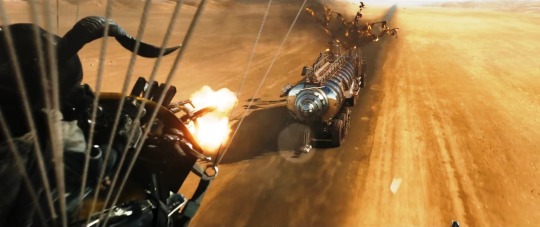
Here's another wild bit of trivia about this movie: you don't actually see top-billed actress Anya Taylor-Joy pop up on screen until roughly halfway through, once Furiosa is in her late teens/early twenties. Up until this point she's been played by Alyla Browne, who through the use of some seamless and honestly really impressive CGI has been given Anya's distinctive bug eyes [complimentary]. It's one of those bold choices that really works because Miller commits to it so hard, though it does make me wish Browne's name was up on the poster next to Taylor-Joy's.
Speaking of CGI, I should talk about what seems to be a sticking point for quite a few people: if there's been one consistent criticism of Furiosa so far, it's that it doesn't look nearly as practical or grounded as Fury Road, with more obvious greenscreen and compositing, and what previously would've been physical stunt performers and pyrotechnics have been replaced with their digital equivalents for many shots. Simply put, it doesn't look as real! For a lot of people, that practicality was one of Fury Road's primary draws, so I won't try to quibble if they're let down by Furiosa's overt artificiality, but to be honest I'm actually quite fine with it. It helps that this visual discrepancy doesn't sneak up on you but is incredibly apparent right from the aerial zoom-down into Australia in the very first scene, so I didn't feel misled or duped.
Fury Road never asks you to suspend your disbelief because it all looks so believable; Furiosa jovially prods you to suspend that disbelief from the get-go and tune into it on a different wavelength. It's a classical epic, and like the classical epics of the 1950s and 60s it has a lot of actors standing in front of what clearly are matte paintings. It feels right! We're not watching fact, we're watching myth. I'm willing to concede there might be a little bit of post-hoc rationalization on my part because I simply love this movie so much, but I'm not holding the effects in Furiosa to the same standard as those in Fury Road because I simply don't believe Miller and his crew are attempting to replicate that approach. Without the extensive CGI, we don't get that impressive long, panning take where a stranded Furiosa scans the empty, dust-and-sun-scoured wasteland (75% Sergio Leone, 25% Andrei Tarkovsky), or the Octoboss and his parasailing goons. For the sake of intellectual exercise I did try imagining them filming the Octoboss/war rig sequence with the same immersive practical approach they used for Fury Road's stunts, however I just kept picturing dead stunt performers, so perhaps the tradeoff was worth it!
4. Homeward

Around the same time we meet the Taylor-Joy-pilled Furiosa in Chapter 3, we're introduced to Praetorian Jack, the chief driver for the convoys running between the Citadel and its allied settlements. Jack's played by Tom Burke, who pulled off a very good Orson Welles in Mank! and who I should really check out in The Souvenir one of these days. He's also a cool dude! Here are some facts about Praetorian Jack:
He's decked out in road leathers with a pauldron stitched to one shoulder
He's stoic and wary, but still more or less personable and can carry on a conversation
Professes to a certain cynicism, to quote Special Agent Albert Rosenfield, but ultimately has a capacity for kindness and will do the right thing
Shoots a gun real good
Can drive like nobody's business
So in other words, Jack is Mad Max. But also, no, he clearly isn't! He looks and dresses like Mad Max (particularly Mel Gibson's) and does a lot of the same things "Mad" Max Rockatansky does, but he's also very explicitly a distinct character. It's a choice that seems inexplicable and perhaps even lazy on its face, except this is a George Miller movie, so of course this parallel is extremely purposeful. Miller has gone on record saying he avoids any kind of strict chronology or continuity for his Mad Max movies, compared to the rigid canons for Star Trek and Star Wars, and bless him for doing so. It's more fun viewing each Mad Max entry as a new revision or elaboration on a story being told again and again generations after the fall, mutating in style, structure and focus with every iteration, becoming less grounded as its core narrative is passed from elder to youth, community to community, genre to genre, until it becomes myth. (At least, my English major brain thinks it's more fun.) In fact there's actually something Arthurian to it, where at first King Arthur was mentioned in several Welsh legends before Geoffrey of Monmouth crafted an actual narrative around him, then Chrétien de Troyes added elements like Lancelot and infused the stories with more romance, and then with Le Morte d'Arthur Thomas Malory whipped the whole cycle together into one volume, which T.H. White would chop and screw and deconstruct with The Once and Future King centuries later.
All this to say: maybe Praetorian Jack looks and sounds and acts like Max because he sorta kinda basically is, being just one of many men driving back and forth across the wasteland, lending a hand on occasion, who'll be conflated into a single, legendary "Mad Max" at some point down the line in a different History Man's retelling of Furiosa's odyssey. Sometimes that Max rips across the desert in his V8 Interceptor, other times driving a big rig. Perhaps there's a dog tagging along and/or a scraggly and at first aggravating ally played by Bruce Spence or Nicholas Hoult. Usually he has a shotgun. But so long as you aren't trying to kill him, he'll help you out.
5. Beyond Vengeance
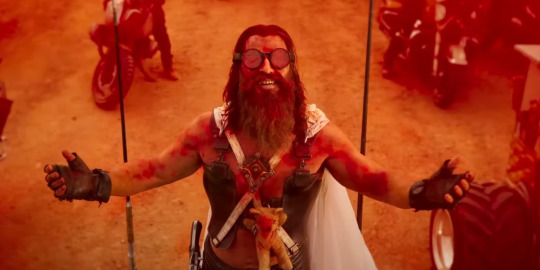
The Mad Max movies have incredibly iconic villains—Immortan Joe! Toecutter! the Lord Humongous!—but they are exactly that, capital V Villains devoid of humanizing qualities who you can't wait to watch bad things happen to. Furiosa appears to continue this trend by giving us a villain who in fact has a mustache long enough that he could reasonably twirl it if he so wanted, but ironically Dementus ends up being the most layered antagonist in the entire series, even moreso than the late Tina Turner's comparatively benevolent Aunty Entity from Beyond Thunderdome. And because he's played by Chris Hemsworth, whose comedic delivery rivals his stupidly handsome looks, you lock in every time he's on screen.
Something so fascinating about Dementus is that, for a main antagonist, he's NOT all-powerful, and in fact quite the opposite: he's more conman than warlord, looking for the next hustle, the next gullible crowd he can preach to and dupe—though never for long. For all his bluster, at every turn he finds himself in way over his head and writing cheques he can't cash, and this self-induced Sisyphean torment makes him riveting to watch. You're tempted to pity Dementus but it's also quite difficult to spare sympathy for someone who's so quick to channel their rage and hurt and ego into thoughtless, burn-it-all-down destruction. When you're not laughing at him, you're hating his guts, and it's indisputably the best work of Chris Hemsworth's career.
It's in this final chapter that everything naturally comes to a head: Furiosa's final evolution into the character we meet at the start of Fury Road, the predictable toppling of Dementus' precariously built house of cards, and the mythmaking that has been teased since the very first scene becoming diagetic text, the last of which allows the movie to thoroughly explore the themes of vengeance it's been building to. A brief war begins, is summarized and is over in the span of roughly a minute, and on its face it's a baffling narrative choice that most other filmmakers would have botched. But our man Miller's smart enough to recognize that the result of this war is the most foregone of conclusions if you've been paying even the slightest bit of attention, so he effectively brushes past it to get to the emotional heart of the climax and an incredible "Oh shit!" payoff that cements Miller as one of mainstream cinema's greatest sickos.
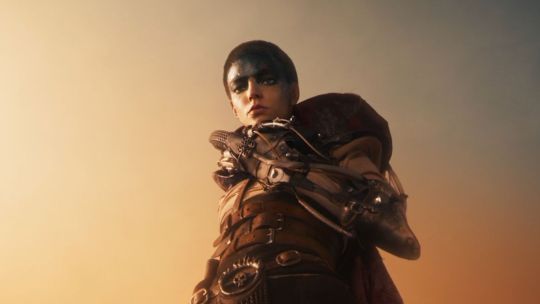
Fury Road remains the greatest Mad Max film, but Furiosa might be the best thing George Miller has ever made. If not his magnum opus, it does at least feel like his dissertation, and it makes me wish Warner Bros. puts enough trust in him despite Furiosa's poor box office performance that he's able to make The Wasteland. Absolutely ridiculous that a man just short of his 80th birthday was able to pull this off, and with it I feel confident calling him one of my favourite directors.
#furiosa: a mad max saga#mad max#mad max: Fury road#furiosa#imperator furiosa#george miller#mary jabassa#dementus#praetorian jack#immortan joe#max rockatansky#analysis#essay#anya taylor-joy#chris hemsworth#charlee fraser#tom burke#charlize theron#continuity#canon#arthurian literature#arthurian mythology#the matter of britain#king arthur#alyla browne
860 notes
·
View notes
Note
whats your favourite narnia book if you have one
Since I grew up as an autistic christian, I have many Narnia Opinions!
So, my favorite book for it's own reasons is probably The Magician's Nephew. I'm always a slut for worldbuilding and backstory and that novel is basically just only that. Some guy we know from another book goes on an adventure and in the process gets to be involved with the creation of one world and the destruction of another? kick-ass.
Best book to adapt? The Lion, The Witch, and the Wardrobe. 1988 BBC version, 1979 Cartoon version, 2005 theatrical? All good, in their own ways. The BBC version is just perfectly 80s and the costumes are amazing (because they are costumes! they did all the monsters by sticking a guy in a big costume and I love it), the cartoon version captures the fucking whimsy of a story where SANTA SHOWS UP AND GIVES EVERYONE PRESENTS and the first person to offer any serious lore about the situation is named MR BEAVER. And the 2005 film has the big battles and CGI and Tilda Swinton as the White Witch which is... so much. I love them all.
But the best book adaptation is the 1990 BBC The Silver Chair. Hands down. It's got Tom Baker's Puddleglum, Warwick Davis playing an owl, 0£ BBC budget greenscreened giants (MULTIPLE TIMES), a group of people discovering IT'S A COOKBOOK and one of them being offended by the cookbook saying they don't taste very good, the bad guy turning into a giant rubber snake. a witch trying to gaslight some humans into believing the sun is a myth, and the ultimate salvation of Eustace Scrubb: a boy who almost deserved being named that.
And since I can't not list basically everything Narnia ever made, BBC's 1989 Prince Caspian and The Voyage of the Dawn Treader is pretty good too. It's a fun "road movie", in that it's an odyssey into a fictional Mysterious Ocean of Here There Be Dragons.
Lotta hits in that one. It's also got a "collect the macguffins!" plot where they're trying to collect the Seven Lost Lords.
But yeah, it's like... the first Island gets them a lord and they get to end slavery. Next up, Dragon TF island (The dragon is Greed... but it's also just a literal fucking dragon). Next, Gold TF island. Gold, it turns out, makes you go insane in your lust for wealth, even if you're already a Prince of a whole country. The gold is Greed, but it will also just fucking kill you because you'll be turned into gold.
Then it's the island of the ugly invisible one-foot guys and it turns out they cast a spell to turn invisible so no one could see how they're ugly but they're not ugly, they just think they are? and then it goes "HEY LUCY COMPARE YOURSELF TO YOUR OLDER SISTER" and she's like "I'm ugly.... unlike her. Maybe I should use magic to STEAL HER BEAUTY?!" and it's like, wow. Is there maybe a theme here about self-esteem in your appearance? and Clive Officemax Lewis is over there going I'LL NEVER TELL.
Anyway it's got the good line about how the Wizard in charge of the ugly invisible one-footed pogo-idiots is that how he eagerly awaits the day that they can be ruled by wisdom, instead of magic. It's a fun approach to magic: it's something that is a shortcut, a crutch, and it's a poor replacement for Wisdom, even when used by "the good guys". Tell me, Mr. FedexKinkos-Lewis, do you have any opinions on the complicated relationship between Christianity and magic? oh, you do? I never would have guessed!
They also find The Island Where Dreams Come True. They don't land there, they just fish a screaming man out of the ocean who is trying to escape it. The sailors hear it's The Island Where Dreams Come True and are like "wow, I could have my own ship!" and he yells no, you fools, not dreams like your wishes and imaginations, your actual dreams come true on this island.
and everyone agrees: Get us the fuck away from this island and lets never return.
Anyway I'm not gonna talk about THE ENTIRE MOVIE/BOOK but it's got a great weirdness at the end where they reach the end of the world (which is flat. It's okay, this is Narnia, a completely different world with different physical rules than Earth), and it's a waterfall, but a waterfall going up?
It turns out Heaven is on the other side of it. They turn around, but the anthropomorphic mouse is like "ehh, I'll take that journey" and becomes the Elijah of Aslan's Country, their equivalent of heaven.
Narnia, won't you?
201 notes
·
View notes
Note
Thoughts on Bonney and her situation? I feel so bad for her… :[
oda has always been really good at introducing information about characters through their backstories that recontextualizes a lot of their behavior in hindsight, and i think bonney is maybe one of the most skillfully done examples of this in the whole comic.
i started suspecting some time before reaching her backstory that she might be younger than she generally appears, because it struck me as consistently odd how everyone on egghead seemed to mention knowing her as a child and how fast she’d grown up, but having that information confirmed in her flashback completely changes her as a character in a way i find really compelling and fun.
like, throughout egghead i have been mentally comparing bonney a lot to law. from the start she’s playing a similar role as he does in the dressrosa saga, as the arc’s supernova ally-of-circumstance, and the similarities between them only grow deeper as we learn more about her history and motivations. bonney is really similar to law in a lot of ways; she aligns herself with the strawhats while on a revenge quest for the death of her adoptive father, who sacrificed himself in order to cure her of her childhood terminal illness.
the main difference, of course, is that bonney is twelve.
she’s twelve! and she was ten before the timeskip. which means she’s about as old in the present of the story (10-12) as law was in his flashback (10-13), or as ace and sabo were in the post-marineford flashback (10); that’s the age and maturity level she’s at. she’s twelve years old and she misses her dad. her tragedy is fresh and recent and she hasn’t quite grown around it yet, and she still has her whole future ahead of her.
i really liked the reveal that her devil fruit basically relies on her being a kid with a big imagination full of infinite possibilities. it’s very thematically resonant with her role as the emotional and narrative core of the arc set on egghead, the island of the future. any future she envisions for herself she can make real!
related to this, she also relates to religion and myth like a child does, where it all may as well be real because anything still could be. when kuma tells her about nika, she envisions someone who’s really somewhere out there in the world who she could find. the sun’s in the sky- maybe they’ll find him up on the sky islands?
and the thing is that she’s right!
bonney is a kid and the futures she dreams become real, because her ability to imagine the impossible hasn’t yet been beaten into submission by the horrible weight of reality. saturn tries to break her spirit and depower her before he kills her by crushing her ability to picture any future for herself, and it almost works.
and then there’s nika, and everything becomes possible again.
398 notes
·
View notes
Text
Gonna infodump about my D&D character
(Sadly forced to keep things confidential because my party members follow me on tumblr…you know who you are 👁️👁️)
I’ve only had Gawain for a short time but OH MY GOODNESS I FUCKING ADORE THIS SILLY GUY!!
Also kinda shocked that the moodboard I made for him got that many notes. That’s a first…
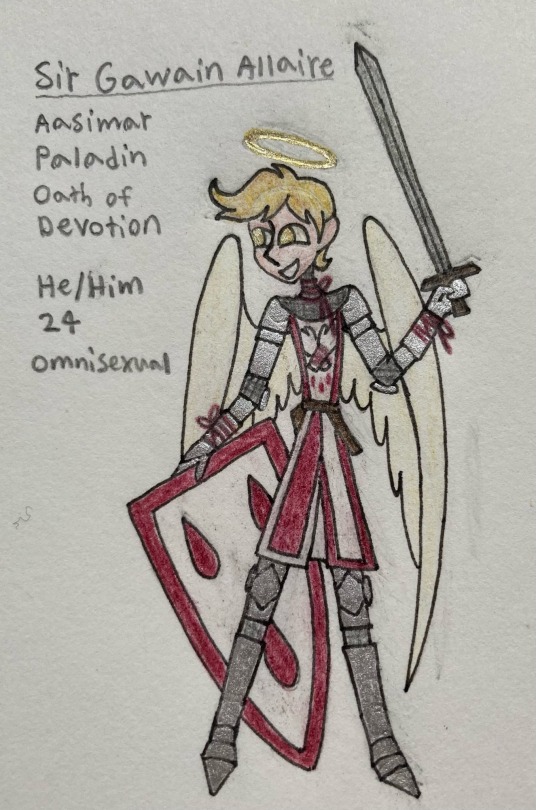
Also please enjoy the drawing @hootbon made for me. I will never shut up about their art.

So��for what CAN post publicly…
Gawain is your token Lawful Good Paladin TM. Bonus points for being a protector aasimar I guess. (Though I might multiclass into a bard depending on how things go. It would fit him well. They’re my favorite spell caster.)
His personality is gonna be SO fun to play. Before I explain that, I should mention that he’s actually the youngest of the group at 24. The second youngest is the Kobold (Maran) who’s 37. So he’s a lot more naive and still understanding himself and the world around him. People often dismiss him due to that unfortunately. But, you know, imagine a dumb collage age boy and you get somewhat of an idea.
He’s a very sweet and compassionate guy, extremely extroverted and fun loving…maybe a bit flirty at times. Definitely cracks witty comments and one liners in battles ranging from something clever to “suck my dick” or something dumb like that. That doesn’t mean he can’t be serious, he absolutely knows when he should. Ironically he’s the most “normal” of the group, often being the straight man. Overall heart of gold and just wants to help people.
He has a bit of a rebellious and impulsiveness to him. As clever as he is, he’s mostly driven by his emotions. It’s always a “do what feels right in the moment” rather than logic. In general he’s just very emotional and struggles with hyper empathy. This also causes him to question a lot of the authority around him.
I’d also say he has that Disney Princess syndrome. Gawain is convinced that he has some grand destiny and is meant for more. He’s always wanted to explore and learn more about the world, meet new people and cultures, live a life of glory and adventure. Maybe he’s in over his head or maybe he’s not…we’ll see.
However, another big reason for doing all this is that he wants to understand who he is…more accurately WHAT he is. He was born to humans, raised by humans, and grew up in a mostly all human kingdom. So he grew up thinking he was one despite some strong differences between him and the others. Aasimar are VERY rare, and more like myths to most people, and others don’t even know they exist. So people either assumed he was blessed or cursed, some treated him like the messiah, and others thought he was a freak and dangerous. So yeah, he never felt like he belonged and wants to learn about himself.
Somewhere in his life he ended up becoming a squire and completed his training just before the start of the campaign…
And that’s all the backstory information I can post because my friends will see this.
I guess I can do a bit of trivia:
It’s still D&D lore, but the world itself is homebrew. Humans are actually not the majority race, far from it. Most humans live in a large archipelago with various human nations. I remember the DM said the estimated population of humans was 20,000 to 30,000. The two mainland continents are one dominated by dwarves and the other by elves, along with other races being far more common on the mainland. Not really about my character but I LOVE that detail. It’s somewhat relevant I guess since I said Gawain grew up in a human society.
The god he venerates most is Ilmatar.
His eyes reflect his emotions and power. When using any of his abilities or when under intense emotions (both positive and negative), his eyes will turn a solid gold color.
Prior to his training, he was a courier. His parents ran his town’s postal service and that’s one of the things that got him into the idea of adventuring.
He’s more of a cat person than a dog person. He likes both, but I feel like he’d go for the cat.
The first weapon he ever used was a bow rather than a sword. The specific sword he uses is an arming sword.
He is a wonderful singer, his voice is almost ethereal in when he sings (little aasimar headcanon of mine).
His favorite study is anthropology, but also really likes history and geography. He’s always collecting little souvenirs and trinkets from everywhere he visits.
He keeps a diary and loves to write stories and sketch things. A lot of story inspiration comes from his dreams, which are often very vivid…and he remembers them super well.
Neither of his parents have blonde hair, nor is it a recessive trait they had. It’s actually part of his aasimar traits.
He talks in his sleep because I think it’s funny.
If this wasn’t a medieval fantasy world, he’d definitely use Gen Z slang. Maybe even tell someone “L + Ratio” or “Skill issue” after besting them in battle. In that same hypothetical reality, his favorite band would be Starset and The Score.
He takes good care of his appearance and health, so he does enjoy certain beauty products. A spa day is his ideal day off.
He hates salmon. He thinks it tastes bad and prefers catfish. I don’t know why I even thought of that fact but it’s there.
#he’s also the first D&D character I’ve ever made#if he dies I will cry#is a lawful good aasimar paladin basic? yes#do I give a shit? no#i love him no matter what#dnd#d&d#dnd oc#d&d oc#paladin#aasimar
58 notes
·
View notes
Note
rant about Gabriel to me I need to understand him
im going to format this like you've never seen the show, just in case you haven't, so if you have just bare with me
gabriel is a bit of an enigma. for the first two and a half episodes he shows up in, he's not even known as gabriel. he's on screen as 'the trickster' and is masquerading as one. (tricksters in spn canon are powerful demigod creatures of myth that can alter reality how they want, normally using their powers to play deadly pranks on malicious humans in ironic ways. i.e mauling someone who tests products on animals via a sewer alligator)
the reason he's doing this as a self proclaimed "witness protection" method is because he's in hiding, pretending to be a trickster to hide from his family; which is heaven since he's the archangel gabriel. surprise surprise. this is revealed in the episode 'changing channels', (season four) which is i believe the best ranked episode on the entire show by the audience and one of my favorites. 'mystery spot' (season three) is another one he stars in (as rhe trickster, not gabriel. we still dont know that), and i think it's the second highest ranked. and 'tall tales' (season two) is the first one he shows up in which is also very highly ranked.
gabriel has a habit of faking his death a lot to escape responsibility, which he does in the episode 'hammer of the gods' (season five [?] i think) after being "stabbed" by lucifer so he doesn't have to really stick around and watch his family (lucifer and michael) fight. but we don't know that it was a fake out for nearly eight seasons. (there is an instance where he shows up again in season nine but that was a fake out and not the real him). in 'hammer of the gods' we also find out that gabriel really had gone all in with his so called witness protection while pretending to be a trickster; so much so that most of the mythological world/pretty much anyone but cas sam and dean knows him as the actual god of tricksters, loki, and not by his true name. later on when he comes back in season thirteen we find out that's because the real loki offered to share the same face with gabriel back when he first came to earth wayyyyyyy long ago to help him out. and when we meet loki later when gabriels trying to kill him for selling him off to one of the princes of hell asmodeus (i'll get into that) it's basically just the actor richard speight jr playing two roles at once. if that makes any sense. one of my favorite episodes, although i think that's just because i hadn't really seen gabriel in months and was over excited. i'll have to see if the hype holds up on my rewatch
but okay, for some backstory on the whole being sold thing, after gabriel faked his death in 'hammer of the gods', he ran off to some island to get in contact with loki and his kids (think fenrir. spn uses real mythological names and bloodlines as side plots sometimes) to go dark again. loki pretends to entertain the idea and let's gabriel play poker with hookers for a few days (gabe has also stared in a porno before and enjoys eating candy even though angels never get hungry. he's fun that way) before betraying him and basically selling him off as a slave to a prince of hell, who locks him away for hundered (thousands maybe?) of years, constantly draining his archangel grace just enough to not leave gabe powerless, but also enough to torture him horribly. it's awful, and all explained in the episode 'unfinished buisness' (season thirteen) which is all about him enacting revenge on loki and the tricksters kids. but the takeaway is that the first time we see gabe after season five, he's a completely different person. almost like a scared animal. if the animal has had its mouth sewn shut by a demon, that is.
anyways, sam and dean and cas help revert him back to his usual self, and he runs away from his problems for a few episodes, before finally confronting them and dying for real this time at the hands of an alertnate world version of his brother michael a few episodes later. the later seasons writing was so fucked up in my opinion, and the way gabriel died was done so wrong, but i think that's because im biased. frowns
my explination of him does no justice. he's a smug, silly, tricky, multi layered, funny son of a bitch that has fuck ass smile where his eyes crinkled at the corner and i. oughhh. i love him. urgh. yeah
24 notes
·
View notes
Text
i love the new pjo tv show don't get me wrong but i feel like it's missing the like, campiness of the original? that got translated pretty well into the musical but honestly 2-3 lines of witty dialogue per episode isn't really getting the original Ridiculousness of the book across.
like it's been pointed out that they seem to immediately know & recognize every myth they encounter, which is part of it, but like...episode 7 in particular made me sigh a lot because they cut so much of the humor! things like annabeth just immediately training cerberus to stay put and them bald-face lying to Charon that they are all dead, actually, they drowned in a bathtub. Together. it was such a nice like, breather before they get into the Very Serious Underworld Scenes and instead...nope, just more ACTION.
and they took out stuff in other episodes that made the tone lighter-things like percy and annabeth getting grossed out by the mirrors in the tunnel of love ride, the dam snack bar jokes, grover eating cans, them playing around in the lotus hotel, etc. i feel like half the fun of the original books was that, at any given conflict, the main characters were either going to sword fight their way out or completely bullshit their way out in the most convoluted ridiculous way possible. which was hilarious and also suspenseful-is percy going to pick up riptide, or is he going to start talking baseball? and them giving impassioned dialogue all the time instead of goofing around a bit just weighs down the whole tone of the show.
i feel like the show is very action-adventure whereas the original book was more of an adventure romp. i also feel like with the new heaviness that's come with multiple POVs (like seeing percy and sally's backstory) the show would really benefit from like, sad shot of sally and poseidon talking then BOOM cut to percy complaining about getting sand on his favorite pair of jeans while on the beach with ares. or something else.
#pjo#percy jackson#percy jackson and the olympians#pjo tv crit#pjo tv series#pjo tv spoilers#percy jackson tv series#tlt musical#anyways. listen to the lightning thief musical it's really good and um. you will cry and also laugh.#also rick hire me to be in your writers room i'll keep you from making dumb decisions. i will also talk about ancient greek culture a lot#i will also Have ADHD in your vicinity. for reference. since the later episodes seem to be forgetting#ADHD would make me take Forever to find the correct ride at the amusement park i can tell you that much
77 notes
·
View notes
Text
My big art project this weekend was to create a design for my other current DnD character - so here’s my first crack at her design! Please forgive my dreadful handwriting

Character lore below the cut
Meet Kismet, my tiefling bladesinger wizard! I made her for a (sadly now defunct) wizard-only Strixhaven campaign. Now I use her as my designated one shot character because she is fun to roleplay, and it’s less stressful to have a wizard that (mostly) won’t die if the bad guy looks at them funny.
Long story short, her parents were both renowned adventurers but disappeared under mysterious circumstances when she was young. She inherited her mother’s magical sword, and is on a quest to find out what happened to her parents. She is a very cheerful bubbly person, but also far too brave and impulsive for her own good. She’s also very obsessed with archaeology and ancient myths. She will always info dump about ancient history. Or wizard gossip. Do not get her started about the latest wizard goss. She has a tiny little snake familiar and is obsessed with murder spagurters. But yeah I hope to play her in a campaign where I actually get to explore her backstory more!
#original character#oc art#dnd character#wizardblr#wizard#bladesinger#tiefling#oc: kismet#dungeons and dragons#dnd art#oc lore#strixhaven
20 notes
·
View notes
Text
inspired by the new minecraft movie trailer and how it reminds me of a shit jumanji, here is my take on the minecraft plot. this took me like 5-10 minutes, so it's not super serious.
I actually want to try spitballing a better plot in about five minutes-
Unnamed Man in Blue and Unnamed Woman in Green wake up in a forest and meet each other while exploring. Anyway, the Plot is killing the ender dragon. Why? It's the most basic thing about minecraft. The achievement is literally called "free the end" so maybe flesh out why. So, the plot is Gather Materials, Find Stronghold, Defeat Ender Dragon, and the end scene is them looking out into the world and talking about going on other adventures. In the movie they come across a variety of monsters, but specifically a Warden and Wither. The Warden could be a genuinely scary chase scene where they don't kill it. Maybe they have to summon the wither as part of a beacon fetch quest.
The movie has lots of references to minecraft community things. minecraft youtubers and developers act as cameos in people they meet. "don't dig straight down" is on a sign near a cave/town's quarry. Maybe they find books similar to those survival guides i saw in all the scholastic book fairs. Have someone hum Don't Mine At Night or go "awww man" when a creeper explodes. Have a reclusive but friendly town of "hermits" (hermitcraft). maybe you pass by someone saying "the aether is just a conspiracy/myth!" just, things the community of all ages will recognize and go "hey! the thing!"
other:
They decide on the names Steve and Alex themselves, idk when though. The nicknames of Green and Blue between them can stick around. Also while i'm here, idc about romance. have them be friends, or partners by the end, or implied whatever.
I want Steve and Alex to have a personality but also have a generic backstory for the "blank slate" appeal and function of their in-game selves. I have a couple ideas- amnesia or being an everyday person, for example. maybe they are orphans, idk. Waking up in a forest is all i'm set on because that could be the equivalent of "spawning in."
I also have a fun idea where it could be an entirely implied Isekai. ("implied" is the keyword because it's never admitted and the only canonical dimensions are the nether, overworld, and end.) Not like the movie, where you aparently watch them get Isekai-ed, but with how they react to Tree Physics, magic, monsters, etc. and people going "you're not from around here, are you" and/or "how do you not know what X is? have you been living under a rock?" (which would then introduce the audience to minecraft concepts and exposition.)
they live in a "post-age of heres" world where it could be implied that the Old People who build all the strongholds and shit are long dead and they disappeared going after the dragon. this immediately puts an added sense of danger to the quest. also an underdog story.
i also would like a reason WHY Blue and Green can defeat the dragon while the others can't beyond "they are the main characters." this could be the new thing the movie brings in, like a new enchantment or making netherite something the Old People didn't have but necessary? idk, this could go into "movie-verse" logic and doesn't necessarily have to be in-direct canon to the game.
you know those characters that minecraft made a while ago? like the different races and genders? those skins could be characters in the movies.
the soundtrack does have the most popular minecraft sounds, in-game sound effects are used, but maybe some "movie remixes" or maybe they pay and jump through hoops to have Revenge playing for the end Credits.
also this is all animated. embrace animation.
#thesearemyposts#minecraft#minecraft movie#i did this but also don't care enough to go beyond so uhhhhhh#lol
21 notes
·
View notes
Text
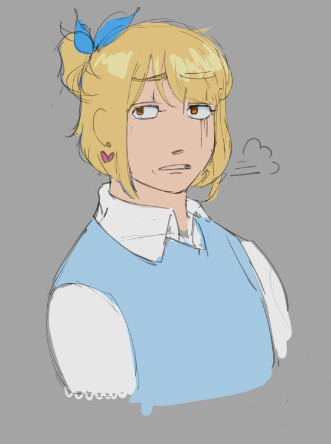
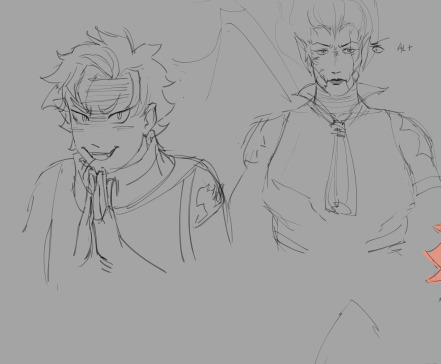
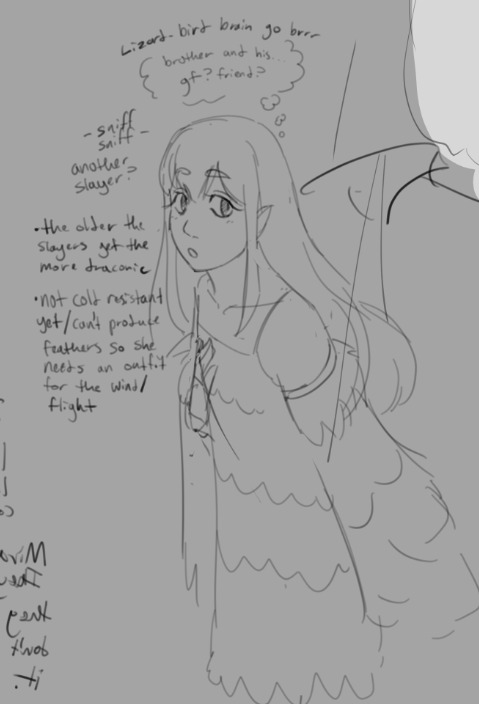
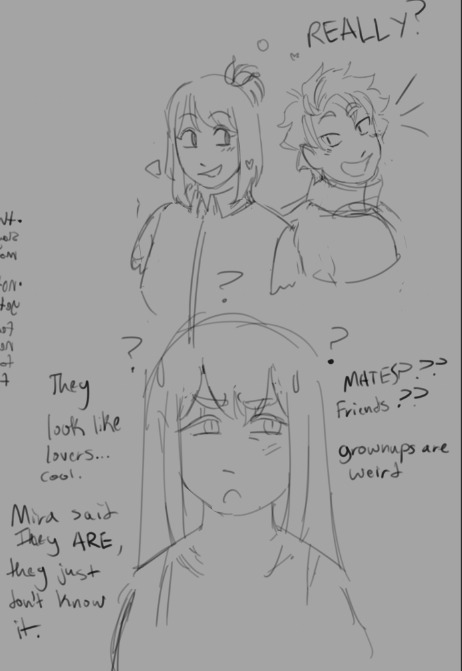
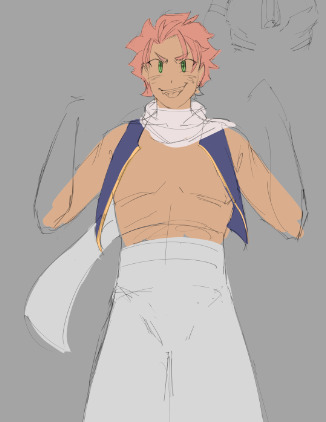
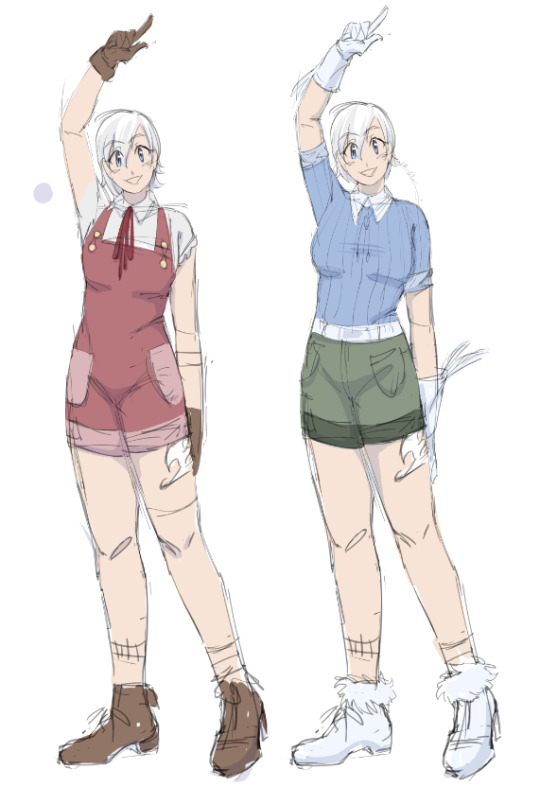
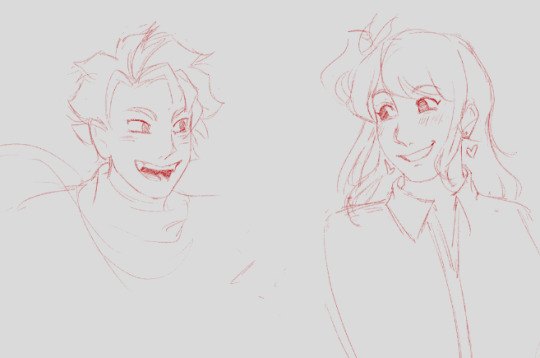
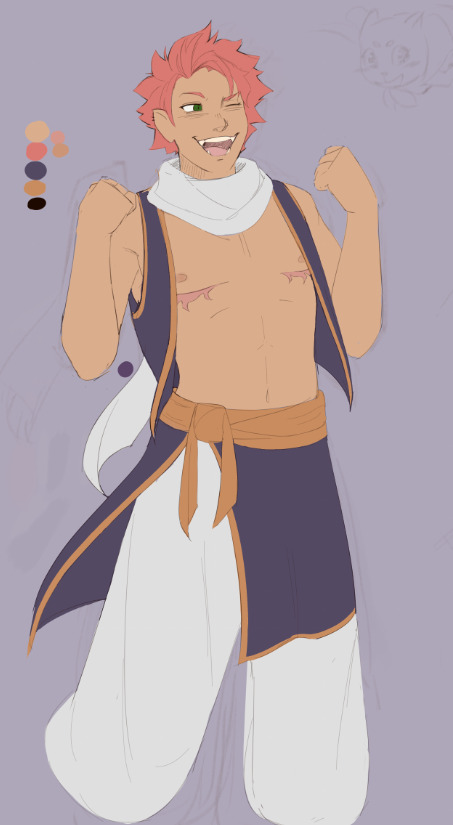
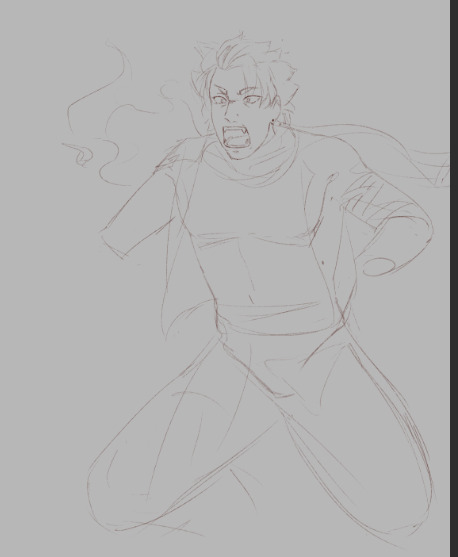
I may not look it but i used to watch ft!!
I've been rewatching some of the episodes and im still wishy washy on whether or not I want to redesign all the characters but here's some recent and old character sketches!! I've been playing around with their designs but trying not to deviate too far so that the characters still look like who they're supposed to be
Idk if anyone would wanna see me redesign/rework every character but I'd post em if there were people who wanted to see that.
Here's the rundown for those who are interested:
My basic ideas for fairy tail are to make every character a fantasy trope/creature/class/myth. Some of the characters will change into a different thing over time as they gain experience. I feel like fairy tail has a lot of potential to write a more modern fairy tale type story because of the whole wizards and magic thing. With dragons and princesses n everything. This is obviously present in the story, but i really want to reinforce that idea. there are some characters who I think really fit this, like Erza (obvi main knight of the story but also has the title of titania queen of the fairies) and natsu (obviously dragon as an mc, sort of a role reversal of the evil dragon. and maybe a fun demonic plot twist haha). But with other characters i may need to make more changes. Lucy is a loose version of the princess (with a fun runaway backstory), but I want her to evolve into a priestess. Grey kinda has nothing going on for him imo, the ice wizard thing keeps throwing me off every time i try to project something onto him. I think i'll go with a hunter -> demon slayer thing. He just happens to use ice magic. i don't wanna go with regular wizard because thats a bit boring lmao. It would also make the elemental thing between natsu and grey funnier bcuz he's a spooky demon and that guys a hunter so you guys REALLY shouldnt get along. They do anyway because the power of friendship lol Anyways that's the basic plan? even if i dont post it on tumblr just know its cooking in the back of my head. thx for reading all this haha
#fairy tail#nalu#Natsu dragneel#lucy heartfilia#wendy marvell#redesign#lisanna strauss#fanart#anime#manga#Fairy tail is so near and dear to my heart still#i really should finish it#but also GOD JUST GIVE ME THE REIGNS I PROMISE I COULD REWRITE THIS SERIES SO GOOD#poor wendy cant figure out if nalu is dating or not#she's like a little sister to natsu in my version#also all the dragon slayers arent just humans who can harness the power. like. its more obviously a part of them#like natsu and wendy naturally bond because dragon pack instincts ig and boom now she has an older brother#also wendy is a sky dragon like why doesn't she wear clothes that make sense for sky magic#she's gonna b cold just wearing that dress in the sky! cover her up!!#also lucy is trans i dont make the rules#ALSO MATES AS IN DATING#NOT SEX LOL
79 notes
·
View notes
Text
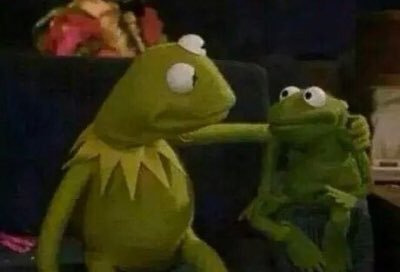
been doing a Slow and Considered utena rewatch... and, look. I am deeply deeply wary of any mode of watching fiction about women that ends up just. centring men. this is not praxis. so as a disclaimer... 95% of my utena thinking has had NOTHING to do with this, it's just that this has become the place I put my motogp thoughts. not my utena thoughts. ideologically I object to even making this post on several different levels. so. with that in mind, and the knowledge that at most a single digit number of people will see this. let's go
one of my fave things about anthy as a character is how much she acts as... a mirror of sorts, not an empty vessel exactly but someone who isn't quite treated as a person in their own rights... like she's obviously not REALLY an empty vessel, she has her own thoughts and ideas and feelings and backstory, but her entire purpose is to not impose her own character on events. so you've got basically every character projecting something of themselves onto her - utena's desire to be a prince, saionji's performance of masculinity, miki's rejection of (his sister's) maturity etc etc etc... and they all essentially see what they want to see, or what they need to see, right. with saoinji he gets the worst of it because he's so obviously extremely delusional about this whole rose bride gig, he serves the function of accidentally revealing comic relief. but they're all at it. which makes it so fun to actually work through the show and detect where anthy is exerting agency... and she is kind of torturing the student council members, right - she might be the victim but she's also the tormentor
and what slaps about this 'witch' role that she plays is that she... kind of ends up bringing the worst out of everyone she comes across. she's unpopular, she's the scapegoat to be blamed when saionji has his depressive episode upon losing her, she's constantly positioned as a seductress just by existing. she brings out the pettiness in people, their smallest fears, lowliest desires... her brother was the one going around saving the maidens in the world - she might have the power, but all she could do with it was spirit him away and focus all the rage and bitterness of the world onto herself. she is the receptor for those emotions, she brings them out and then gets them projected onto her. and a big theme in this relationship between anthy and the outside world is this horror of crowds, of the judgement of mobs - which first really comes out during the ball in episode three, where nanami abandons her... "everyone's face begins to look the same and I get scared" she says earlier that episode
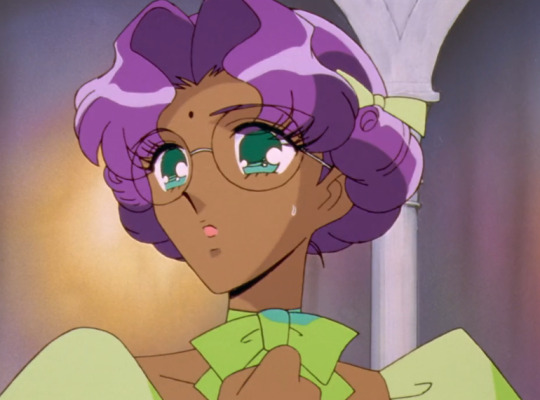
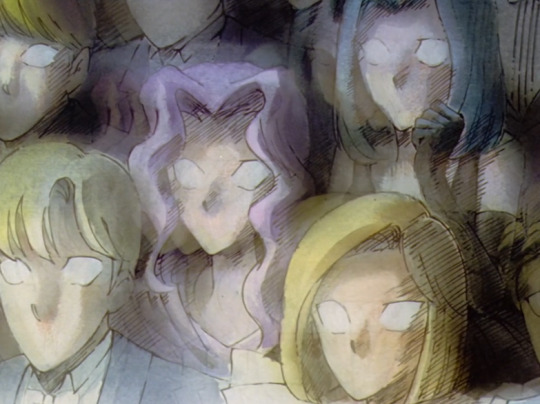
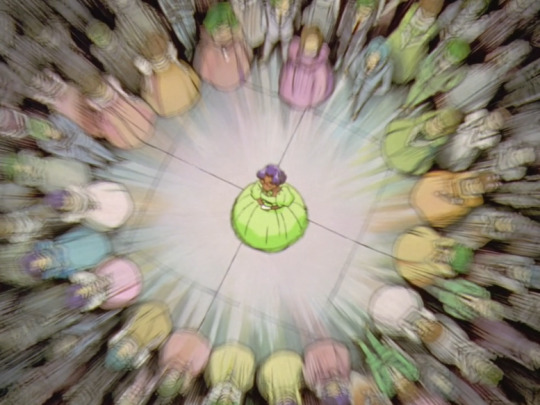
and then in episode 34 you get the 'explanation', the foundational myth of the show. anthy acting to protect her brother, who had taken upon himself the burden of saving the world - and in doing so takes the burden upon herself of the world's hatred. its fears and its cruelty. so you see the villagers come for her and enact their punishment... stabbed by each of them and hung up in eternal suffering
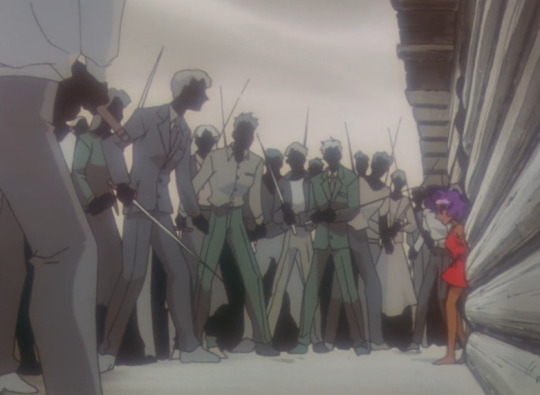
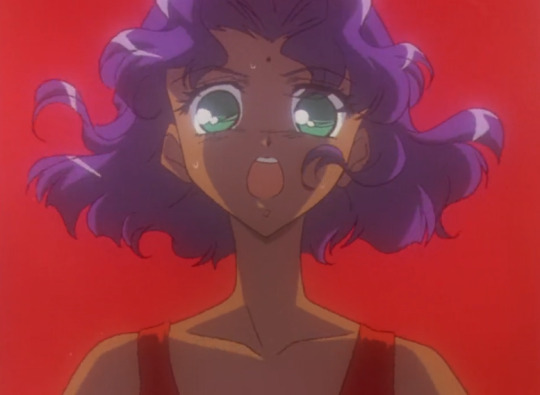
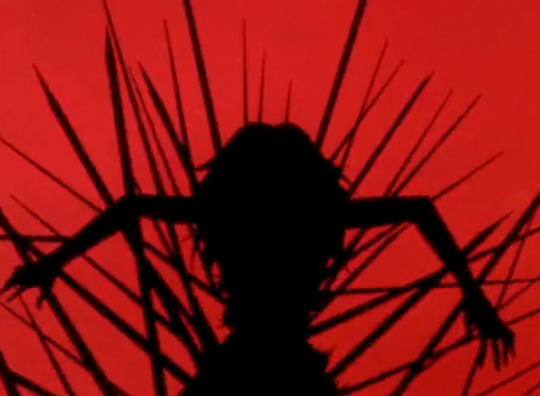
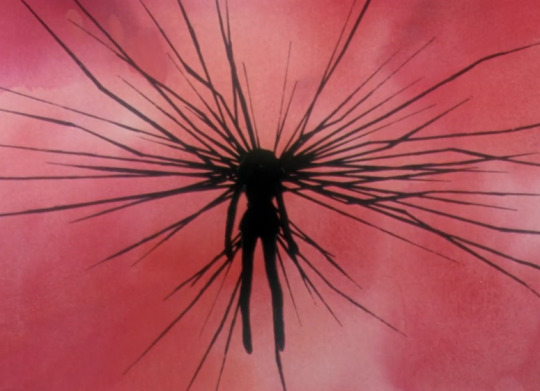
and that's the role she then takes in the series, right. she's the one who is leading mikage in corrupting students, whispering in his ear and pretending to be his loved one to further the cause. she provides miki with this ideal of submissive virginal femininity so he can fully condemn his whore sister. she teases out wakaba's envy of the special and the unique and the desirable by making herself appear the willing recipient of saionji's affections. she judges them even while she is judged - she serves a transformative function, she ends up revealing the worst in those who cross her path
and then you've got utena, who is the exact opposite - the extremely popular jock not yet disillusioned with societal ideals. her gender nonconformity isn't punished within the school environment (and her teacher's attempts to enforce the uniform code are never treated seriously, are merely scoffed at)... the girls love her for it and flock to her when she shows off her basketball prowess, swoon at her for merely walking past
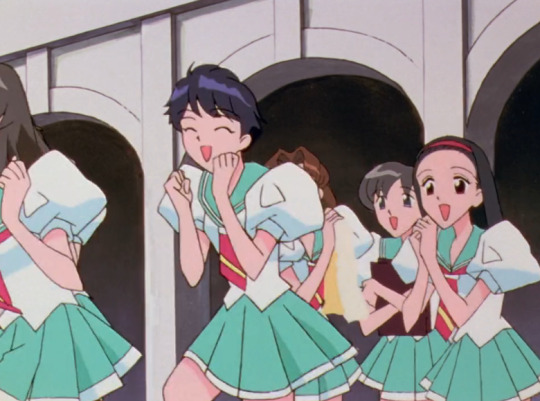
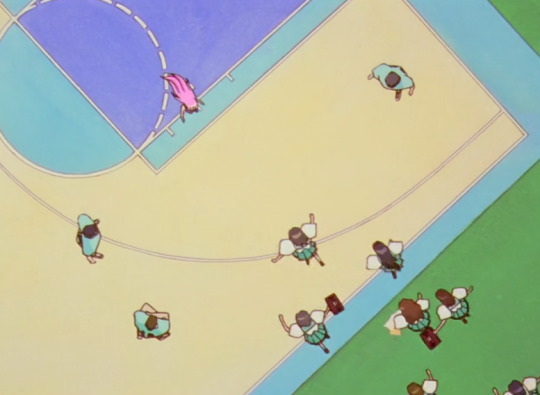
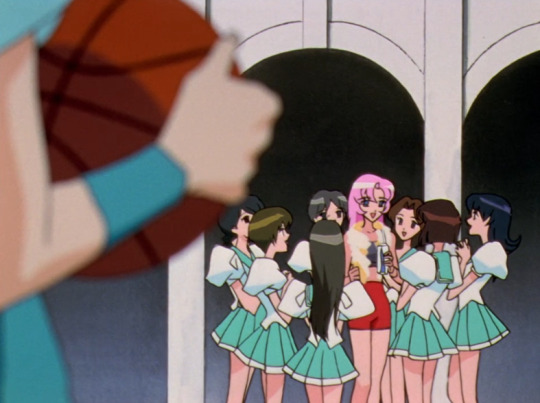
utena is a strident individualist, one who with her protagonist juice doesn't even need any student council exemptions to defy the dress code. she stands out, she is supposed to stand out - and she is rewarded for it, up to a point. whenever she suffers her greatest defeats, she is forcibly feminised... whether she does so to herself, or whether akio quite literally dresses her in the costume of a princess. when akio has sex with her, she seems to embrace this femininity as a kind of maturity - but it is a false coming-of-age. this is not a style of presentation she would choose for herself. she wishes to be the prince
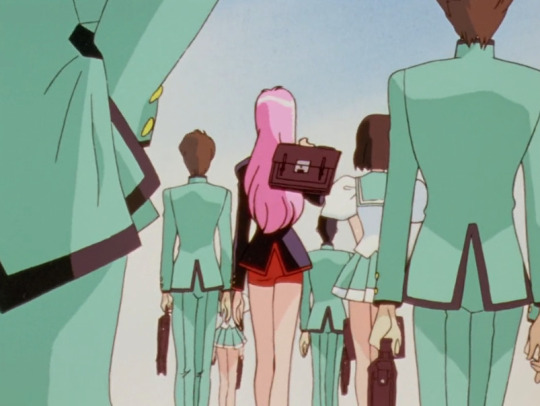
right then. none of this is particularly novel analysis - it's really just set up for where I'm going with this post. so that we're all on the same page. no particularly graceful way to manage this transition... but well. time to talk motogp. and I was thinking about some of this projection and perception business in relation to valentino. even if there is obviously something counterintuitive about relating anthy, whose entire character is about weaponised passivity, to valentino, who is anything but passive... but hear me out
valentino obviously has this stable enduring popularity going for him - one that resembles utena in being so unconditional he almost doesn't really have to care about it. public perception does matter especially when he can wield it as a weapon, but the public's love is never in question. utena can essentially opt out of a lot of the conventions and norms of the school because she doesn't even have to consider a world where she might be rejected. she is liberated by not having to fear the role of the social outcast. there is something about this with valentino too, who was horrendously popular before he even wanted to be and was prepared to deal with that level of attention paid to his every move. it's really key that this affinity starts when he's about 16-17... from then on, he is the public's starlet and then their god - and even when he has his scandals and controversies, that fundamental dynamic won't ever change. you see with a lot of his rivals how... there is this concern with image, right, this desire to be loved, or at the very least accepted by the masses. that simply isn't a concern for valentino, who often seeks to manipulate but far more rarely attempts to persuade. his popularity is a fact of his existence
Akio: Oh? Wakaba-san... Utena: Right. She's completely different now. Akio: Like the goddess who leaves her name to the stars in the heavens... is that how it is? Utena: But how did she become so pretty all of a sudden? Akio: You don't understand, do you? You, living out your predestined fate... Utena: Huh? Akio: There are special people in the world. And they are always noticed. For example, like yourself... Utena: Me? Akio: Attend me. You're not particularly self-conscious, correct? That is the special quality that you carry from birth. Utena: Oh? Akio: Most people are but a single person amongst multitudes. However, given the slightest chance, they will shine with a light that they have never had before. Utena: I've just wanted Wakaba to be happy for a long time. Akio: It could even be said, that for many people, their special time lasts but briefly.
"you're not particularly self-conscious, correct" - and of course, this rare narrative juice allows them to transgress the established norms of gender without being punished too severely. utena can claim her role of prince, valentino can allow himself his girlish locks. it is during this time period that the public falls in love with him, the flamboyant clown who makes a mockery of the machismo of motorcycle racing. remember what valentino's very first rival in gp racing said:
“I saw a young guy with dyed hair and earrings who was like Superman on the bike. I thought to myself: 'That’s not for me.’ At first it was a shock. In 1996 we had already clashed a few times. He touched me once, we had an argument. In 1997 Valentino Rossi made me retire. But that’s not a bad story for me.”
it's transgressive - but it's ultimately going more or less unpunished. utena has her flocks of female admirers, straight men can't seem to get enough of valentino. he does not need to be self-conscious. he can be affected by controversy like anyone else, but rarely is he actively attempting to win popularity. he was loved enough early enough that it has become nothing less than a fact of his existence
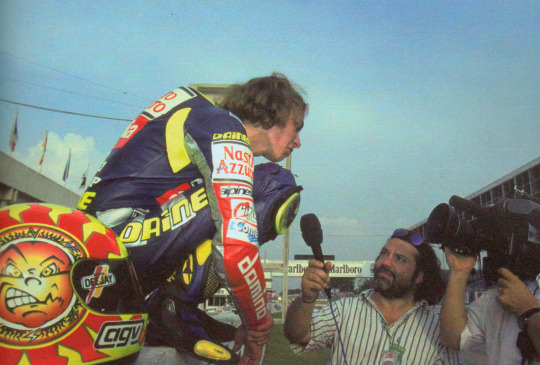
which obviously brings its own perils with it. I've posted two extended discussions in valentino's autobiography of his relation to fame - and in fact they follow directly on from each other, first here then here. in one he frames his preference for the night in terms of the anonymity it provides, these precious moments where he can disappear. the night allows him to be unseen, to escape the crowd at last. his fame is such that he cannot live an ordinary life - and the italians never fail to recognise him
As I say, I have a special relationship with the night. I like moving in it, living in it, thinking in it, relaxing in it. The night fascinates me, because it’s the period of least confusion. The world calms down, it goes quiet. And, besides, I’m Valentino Rossi. I’m wanted… I’m a fugitive.
the second excerpt goes into more detail about his relationship with the italians - for all his love for them, how he struggles with the familiarity they assume. the extent to which they treat him as theirs... he talks of 'types' of italians, who all want different things from him - but what they want says more about them than it does about him. he might as well be a mirror. he is not expected to contribute to those discussions, merely to be a prop within them. the worrier, the sensationalist, the moralist... they all bring so much of themselves to this encounter and little of valentino - the idea of valentino is enough to make them content. which gets at the very function of sports, right. this arena of heightened emotion that you can project all your everyday worries and fears onto, a form of escape and also of release. artificial competition, in truth meaningless but the feelings are still plenty real. the very process of being a fan of someone involves a form of projection. you see what you want to see, you respond to the traits you want to respond to - and in the end, you form a one-sided bond that you get something out of emotionally speaking. the public persona and the athlete and the competitor and the character and the person... there is some overlap here, but it is far from absolute. if anything, the person is the least relevant. who cares about the contents of their hearts? this is not about loving an individual, but instead loving what the individual/team represents to you
and in that spirit, let's return to how I framed anthy's narrative role above. this object of projection, yes - but also this plot device to tease out hidden truths within the other characters, to allow them to reveal the worst of themselves. anthy draws out all this resentment and rage and then concentrates it upon herself. now obviously, valentino functions a little differently - he is not getting the masses to hate him. quite the opposite... the shared thread is in drawing out extreme emotions, in how he can become an idea in people's minds more than a person. which is where we get to the most pertinent other 'characters' in valentino's tale - his rivals, who themselves are on their own narrative arcs within the sport. who bring an awful lot of themselves into this rivalry, to an extent that sometimes feels like it's being missed when valentino's feuds are being discussed. what makes valentino so narratively useful is his malleability, how many different versions of him have existed across his career... the fact that he likes to vary his appearance fairly drastically provides a bit of a convenient navigational guide. a way of expressing himself that varies over the years and points to his self-perception as well as the role he will now fulfil. different rivals will have come across entirely different versions, each suited to whichever particular moment of valentino's career he found himself at... in some ways, what's most fun about valentino is that... as much as he is a person, in the context of the sport he is also a plot device, this surefire way of generating narrative tension that is really pretty unique. he's basically a way of putting guys into Situations, right. it's such a great idea for a sport to just have someone around to consistently put guys into Situations
and what that involves is rivals who are also pouring quite a lot of themselves into these rivalries... oftentimes they see in valentino what they want to see, or what they need to see, in a way that is only tangentially connected to 'reality'. here, it is jorge who is kind enough to provide us the parodic extreme, with his biography littered with film references and comparisons to other sports that all provide the road map for understanding his view of the world in the late noughties - less in the specifics of any particular inspiration he cites, but more in what it tells us about how he is processing events. valentino very obviously has a designated role here, this established legend of the sport who jorge can learn from and measure himself against and eventually conquer. the emphasis is very much on honourable combat and mutual respect - albeit with jorge's flair for the dramatic, this prior understanding that rivalries are supposed to get a bit ugly. jorge during the first half of that particular rivalry is on his own little coming-of-age arc that has markedly little to do with valentino the person. jorge talks of wanting to make himself a 'character' like that of valentino's, he desires the love of the public... his disillusionment comes when he realises that his end goal might not be particularly achievable. championships, yes - but the kind of affection valentino inspires? not a chance
instead of adoration, he is faced with widespread contempt and hatred, often at the hands of valentino's fans. it is a realisation the creeps up on him just as he wins his first championship... given the timing of motegi, you could say he is being forced to come to grips with this at the precise moment when he seals the title. valentino hardly shies away from adding fuel to the fire in that 2010 season, unimpressed by jorge's ill-advised gesture with the shirt at mugello - so painfully jorge in a way that was never going to work out for him - and later provoking him at motegi in the heat of battle. this is not valentino attempting to win over the masses. he knows their support is baked-in. often, he does not have to do his own dirty work where mind games and such are concerned... the media can generally be trusted to harm his opponents more than they do him, without much intervention on his part. valentino is far from a passive agent in this feud, but he can allow himself to be more restrained than sometimes appears. their rivalry in 2008-10 does much to change jorge, but valentino is left entirely unaffected
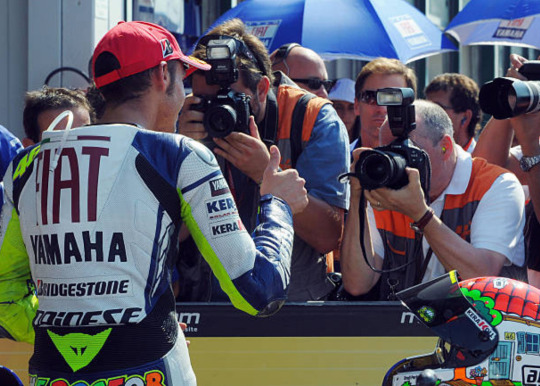
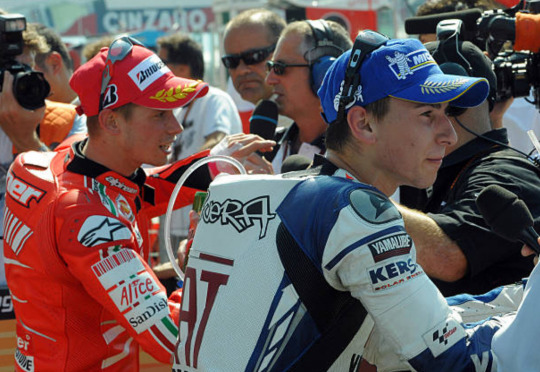
sullen biaggi courting a woman called valentina in a sequence that would make freud wince - unable to find joy while valentino tortured him. image-conscious sete priding himself on the respectful rivalry right until the moment where valentino laid bare the ugliness beneath. tormented casey, finding in valentino echoes of all his neuroses and more besides. brash jorge, who had already assigned valentino a role from the start, before finding that valentino might be possible to beat but impossible to imitate. and the brave marc, so keen to take his place at his idol's side in the pantheon he forgot to consider what fighting him for real might look like. valentino represents something completely different to each of them... it is remarkable in its own right that all three of sete, casey, and marc were so completely blindsided by any enmity developing in the rivalry. sete, who thought himself different from biaggi, casey, who thought himself different from biaggi and sete - marc, who thought himself different from all of them. sete befriended valentino, whereas all three of casey, jorge and marc idolised him at one point or another. each was eventually surprised by valentino in some way... for each of them, valentino was the single most influential rival in changing them as people. in their character arc, if you will
obviously, when you talk about projection, you do have to pay special attention to casey. who was really working overtime on the projection front. the casey/valentino rivalry isn't quite as interpersonally convoluted as valentino's rivalries with sete and marc, doesn't quite have the comedic flair of the jorge feud - but I'd wager that in terms of thematic richness, it comes out on top. a lot of the heavy lifting is done here on the casey side of the equation, given that valentino is more or less a static character in this rivalry. he is more casey's foil than vice versa. he is a plot device to provide us a thorough vivisection of casey's character. how much you enjoy this rivalry will ultimately depend on how interested you are in casey as a person, which *stares into the middle distance* does feel like a pretty niche area. obviously, this thematic richness makes it extremely utena-able, as has been previously discussed in this parish. it is the rivalry that has by far the best colour-coding, which - shush, this matters to me. and crucially casey has been so kind as to ensure that it matters... by giving us the key insight into his psyche that 'things being too yellow' is a thought that has existed in his brain. casey is hot-headed, defiant, wildly talented - valentino is calculating, cunning, and relies on those traits more than any other to get the edge over casey. talent vs ambition, if you will
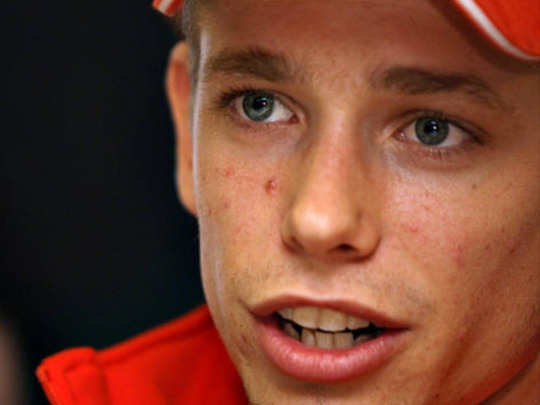
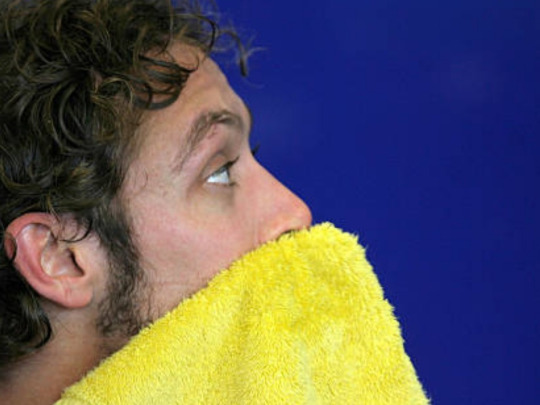
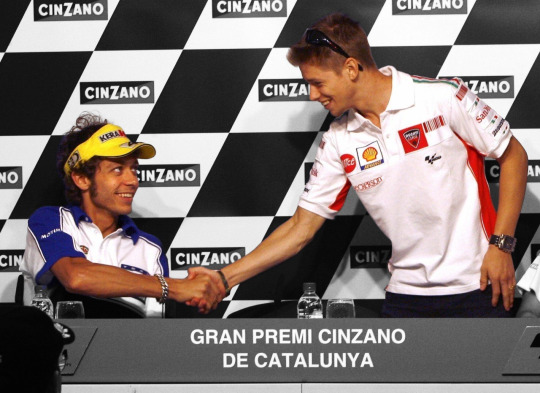
what makes casey so utena-able, right, is that a lot of his sturm and drang essentially relates to the job description of being a rider. it's his role that he's chafing at, the elements relating to politics and public performance and all the rest of it. he has to make his peace with this role to some extent - and then he walks away entirely (achieves revolution, if you will). though entirely is maybe overstating things... after all, he hasn't completely shut himself off from this world. he still gives interviews, he has opinions, he sells his side of the story. he's not suddenly un-learnt the lessons from his time in the sport. there's a certain level of media consciousness, an ability to play the game, that clearly distinguishes him from his teenage self. he's grown up. casey's story is always in conversation with that role of entertainer, where he rejects it and struggles with it and begrudgingly accepts it. and while casey might not yearn to be loved, exactly, he does want to be appreciated. he wants to be praised. he wants to be understood
"we [jorge and I] both can be misinterpreted because of how we appear" // "and I hope to go to dinner with him [valentino], to tell each other, from our point of view, what our challenges have been"
if valentino is the witch, then casey can play the role of one of the aspiring princes - and the amount he manages to project onto valentino could fill a small library. neuroses about being excluded from the club, about being the perpetual outsider, about the system favouring others, about his isolation, about how he cannot treat racing as anything other than serious business, about his feelings of cultural alienation at least partly stemming from his isolation crystalising in a very particular view of the european soul, about not being given enough credit for his talents, about people unfairly judging him, about undeserving success, about being judged as an entertainer not just a rider, about having to sell his story to the press, about being seen as mentally weak, about the idea that he might be broken, about having his physical issues not taken seriously enough, about not being treated with respect, about others bullying him on-track, about others riding dangerously, about being publicly embarrassed... look, I think you get the point - all of these can somehow be found lurking in the rivalry with valentino
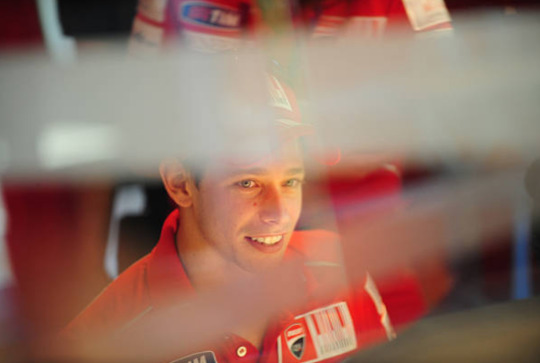
the thing about this rivalry is that you sat someone down in 2006 with a detailed psychological profile of casey but zero knowledge of motogp and came up with the brief 'come up with a guy to torture casey', honestly I don't think you could come up with a better concept than valentino. he just nails it on basically every front. as has also been discussed in plenty of detail in this parish, another particularly pernicious element is valentino's interpersonal charm - which works perfectly well to bewitch undersocialised brats in its own right. valentino is this larger-than-life figure within the sport and casey is unfortunately also very taken with him as a person. which, okay, maybe the lesson is to tell valentino to stop being so nice to twenty-year-olds - but broadly how their relationship develops in 2007 is primarily down to casey being a bit of an emotional mess. valentino is basically on neutral mode in how he approaches that rivalry, keeps a little distance as the battle lines are drawn but fundamentally is quite reserved and relaxed about the whole thing. given that he never gets quite as cold towards casey as he has done towards all his other major rivals at one point or another, this leaves casey in a position where he increasingly has to reckon between a perceived mismatch between valentino the person and valentino the character. the way he has dealt with this discrepancy is a combination of a) by verbalising it and implying he never really knew valentino 'as a guy', and b) by retconning how valentino actually behaved towards him over the course of their rivalry. it is quite convenient for casey to say valentino made an enemy of him the moment they became title rivals, that he flipped a switch and decided he wanted to destroy casey. it is also quite probably not true
casey's problem is that he tends to be someone who communicates his grievances in a fairly direct and straightforward fashion; he's not shy about voicing very specific complaints about everything from the media to the circuit officials to his team to other riders to the track to the constellation of clouds. as a result, it's actually pretty noticeable when he does not do this. laguna 2008 is one example where he is perfectly entitled to his general complaint about valentino's conduct - he is, after all, correct in his belief that valentino was willing to do whatever it took to stop casey from winning that race, including crashing them both out - but you do have to wonder why he is so coy about pointing to specific problems with valentino's riding. he flirts with accusations of brake checking, he says the corkscrew overtake was a problem but just one of them (perhaps not even the main one), he says the cameras weren't showing valentino's most questionable moves. which you'd have to say is highly unlikely. and we do actually know what casey does when he has what he believes to be a valid and defensible grievance where valentino is concerned - look at jerez 2011 and how he has beat that particular horse so often its bones are now thoroughly reduced to dust. this was caught on cameras and casey is in no way shy of referring back to specific details, most infamously the helmet valentino was wearing. we also know that casey is perfectly willing to engage with specific media utterances where valentino is concerned. exhibit A is how he never forgave valentino's crew chief jb for making it sound like the ducati could be fixed with some set-up changes - a wound that runs deep enough it made it to casey's autobiography. exhibit B is... well, any number of petty incidents over the course of 2011-12, including a particularly stupid one where an italian magazine reused some old valentino interview from somewhere to make it sound like valentino had attacked casey in late 2012, which casey then got snarky about on twitter (not the high point of that rivalry on any level)
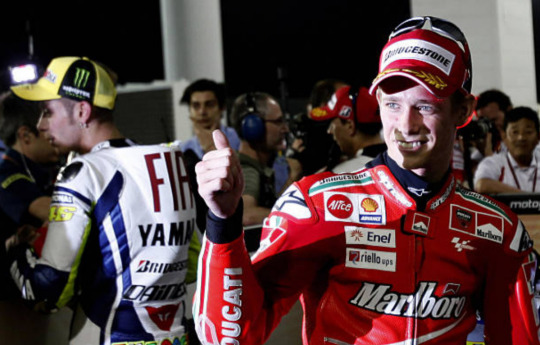
given all that, you do start to wonder when exactly valentino supposedly became such a sore loser during 2007. now, what casey most likely actually means is that he did not appreciate valentino's comments about his struggles with the michelin tyres, and how that was used by certain parts of the media and a lot of fans to suggest that casey's wins were any less worthy. which of course is unfair and unpleasant for casey to have to deal with... but once you notice the vagueness, you do start to wonder why he is so restrained in issuing any more specific complaints. in an odd way, casey can actually bank on valentino's own reputation here - even by this point, valentino obviously had a bit of a reputation for being quite ruthless with his rivals. which means that you've got this situation where journalists are reporting on what casey is saying about valentino, without actually including any specific examples of what he could be referring to. let's be blunt here - I have found a lot of quotes of valentino in that 2007 to early 2008 stretch give full credit to casey for riding very well, and no evidence of anything that should have attracted this level of remonstrance from casey. that doesn't mean valentino hasn't said anything... it is obviously way harder to be definitive about this kind of thing the further back in time you go and there probably will be something he said at some point to some italian reporter that somehow made its way back to casey. but also... so what. if valentino said something mildly snarky about the guy who was schooling him to that year's title, then, y'know. whatever. who cares
now obviously casey does care - and he has this fun combination of being reasonably impervious to valentino's mind games on a competitive level (for the most part) while also being extremely ticked off at them. I'm not sure I'm quite convinced by the 'valentino deliberately got the donington crowd to boo casey' story - it rates about at the same level as the 'casey said jorge was faking his injuries' tale as an anecdote by a single reporter with some broadly supportive circumstantial evidence but nothing particularly definitive. (also, in this particular instance, obviously only valentino will truly have known what he was doing - unless he was yelling 'boo casey' at the brits, at best this is all conjecture.) it does feel reasonable to believe valentino did like to weaponise his popularity, make a show of the cheering crowds in a way that was also a touch targeted... the shirt comment at motegi 2007 I could easily easily imagine as something casey was quite sensitive to (perhaps also the reason why he has never brought it up since) - an actual heartfelt gesture that valentino turned into a bit of a joke. failing to shake casey's hand on-track when he sealed the title is... tough to take seriously (perhaps the reason that too has not been mentioned since), likewise the story that casey didn't take kindly to valentino rocking up to casey's home circuit with special livery and leathers. this is... I mean, it's fine, isn't it. usually valentino's tales manage to be way more bonkers than what I'm used to with tennis, but on occasion this is the kind of thing where I wonder if I'm too desensitised. everyone plays some mind games, right
the other more unknowable variable is how their interpersonal relationship developed, whether valentino really had been way warmer with casey before casey was regularly beating him. again, the evidence I can provide with my own eyes sees basically zero difference between early and late 2007 - certainly not in term of tone of parc fermé congratulations, which casey so diligently provided us as a yardstick in his autobiography. yes, the head rubbing rate goes down, but again. this is also broadly to be expected between title rivals. at this stage at least, there really is nothing untoward happening. if valentino is talking less to casey because they are now direct rivals, then... fine. sure. fair enough, really. whatever casey might think, this is perfectly normal behaviour. valentino obviously ends up dramatically escalating the rivalry on the track - and however you feel about valentino's conduct in that race, this is a straightforward case of someone responding to real competitive pressure in a way that ended up working out well for them. just like valentino's choice to switch to casey's tyres - you'd have to say that in pure competitive terms, there really is nothing to fault about valentino's decision-making in this particular instance. you can actually make a pretty compelling case that valentino is never as close to being a rational actor as he is in this rivalry. how he conducts himself in that rivalry, how he handles the interpersonal elements, how he thinks his way through the on-track puzzle... you can clearly trace the logic in each step. it's ruthless, yes, but entirely cold-blooded
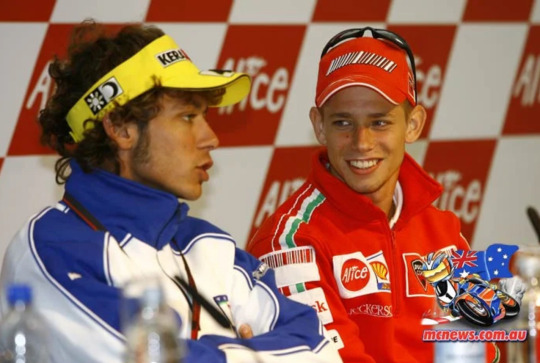
so. let's circle back to how valentino is the very worst rival anyone could possibly have cooked up for casey specifically. a lot of that is how a lot of casey's neuroses interact with valentino, how valentino manages to tap into quite deep, half-suppressed feelings of anger, fear, loneliness... it's in how valentino challenges casey both on and off the track, how valentino forces casey to learn some of his tricks if casey wants to be able to compete. and some of it is about how valentino isn't quite as easy for casey to just hate in peace. casey's problem is that in a very theoretical sense, he does like valentino. in another world, he would want to be valentino's friend. casey speedruns his disillusionment because he's a sensitive young guy who needs somebody to tell him that he's doing a good job now and again. unfortunately that person was just never going to be valentino
failing friendship, what casey does instead is project about a million of his issues onto valentino. and what's interesting about this is that it is possible for him to do so. that valentino is malleable enough a character - slippery enough, if you will, that casey can see whatever he needs to see in valentino. that he can piece this together in his mind. in rgu, anthy as a character functions by being so passive that she draws the other characters into projecting their own issues, desires, angst onto anthy... the only certainty is that she will have some kind of an effect on every character. obviously, valentino is far from passive - but you could say that his default charm somehow manages to play out in quite a similar way. he's larger-than-life, his reputation precedes him, he's so many things to so many people. he can be anything to them, if they so choose. if anything, you actually kind of need valentino's charm in this particular setting, considering he's constantly surrounded by repressed loners who need someone to draw them out of their shells a bit. once valentino has worked his charm, all bets are off. it is the extent to which valentino is synonymous with motogp itself that allows casey to see all his myriad issues with the sport reflected back at him. casey believes that valentino is always looking to make an enemy out of his rival - but, ironically, this has never been less true for valentino than it is in his dealings with casey. lonely, tormented casey... he is the only one who could make a rivalry feel like a personal exorcism
here's something to consider: for all that valentino engages with the public far more readily than casey does, there is an argument to be made that casey cares significantly more about what people think of him than valentino does. as said up front, valentino has been so secure in people's adoration for him for so long that it has morphed into a simple fact of life... for better or for worse. incidentally, this is something people get wrong about how valentino approaches the marc rivalry - it does not matter to him if there is controversy, if people hate him for what he said, if marc fans all renounce him... even if common sentiment swings against him. he isn't attempting to persuade. he is fingering a wound and pressing against it for the sake of the pain itself. the love of the people is something he can be assured of until the day he dies - if he is controversial, then so be it. what valentino has always insisted on is the ability to define himself, and he will not accept letting anyone think he feels any differently about marc than he does. generally, he has been far more willing to let others tell the story of the rivalry for him past the conclusion of the rivalry. in sete's case, he mostly opts not to talk about it at all. he has guided the narrative as far as he needed to take it, but no further. this is not a game of persuasion... when casey engages with the public, he is determined to make them understand him better. to the extent that valentino attempted to get the masses to do his bidding, he did so either for the fun of it or as another tool at his disposal. it mattes less what people really think, as long as they can put pressure on his enemies. the crowd is a mob is a weapon
obviously in this particular dynamic, it is casey who gets the unfair brunt of the public's hatred - valentino, for all his transgression, is loved unconditionally. casey is too surly, too whiny, too flat, too withdrawn, too self-critical, too stubborn... he loses the masses before he even understands that he needed to win them. jorge was a long-term student of valentino who had put excessive amounts of thought into how one would go about replicating that sort of character - casey, by contrast, felt that surely when he proved himself in the sport, popularity would follow automatically. for all the joy of 2007, for all that he repeatedly emphasises in his autobiography how happy he was... it probably tells you something that a reasonably sympathetic interviewer described him in early 2008 as an "angry young man" whose mentality was informed by "bitterness and rejection". what happened was this - casey had spent years and years fighting and struggling his way to the top, had been put under unfair amounts of pressure, had suffered and doubted himself and suffered some more... with the expectation that, once he reached the pinnacle, he would have won. finally he would definitively prove how good he was, finally everyone would give him the credit he was owed. casey might not desire the adoration of the masses, exactly - too self-conscious, still the kid who hid in his helmet because he was embarrassed at the idea of anyone cheering him on. but he did want a little of that... certainly to be seen, to be understood. to be respected for what he was and what he could do
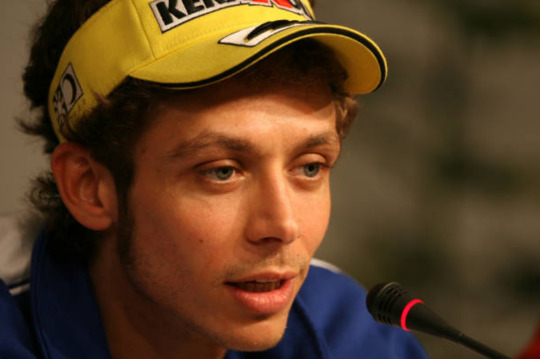
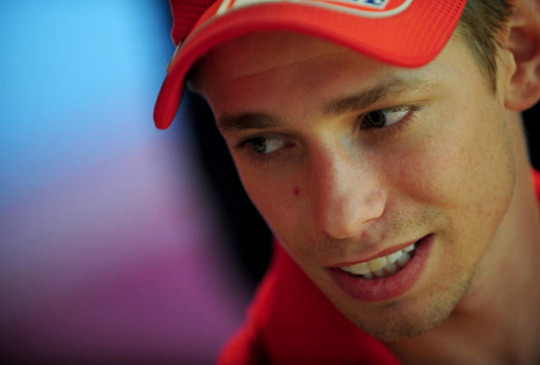
in the end, however much he enjoyed his title, the experience of 2007 will have felt like a disappointment. all of casey's prior angst did not suddenly dissipate because of his dominant season. he accomplished everything he always dreamed of accomplishing, and it did not suddenly erase what he had gone through to get there. worse still - the distaste of the viewing public, having just been treated to a close title fight between two of the most popular riders in an all-time great season for racing, in response to the 2007 season was palpable. casey wasn't supposed to be the challenger. he had shown them all for sure, but few pretended like they were particularly happy about that. the establishment, if you will, was not thrilled - valentino wasn't winning, the top american wasn't winning, the top spaniard wasn't winning. the racing was boring. none of this was casey's fault, but he was inevitably going to be the lightning rod for many of these criticisms. and it rankled. "it's been frustrating because everyone said my results were down to other things." "whatever we do we don't get credit." when he talks about feeling bad about getting the prize for young australian of the year over something as unimportant as motorcycle racing, and the interviewer prompts him that he has gotten some credit - "yeah, but so many people in press and paddock just want to put us down"
perhaps this sort of thing is part of what made casey so good, but on a human level you do feel like it would have been better for him to care a little less what the naysayers were saying. there were plenty of people who acknowledged just how good he was - not as many as there should have been, yes, but it was hardly a blanket dismissal. and he wasn't doing his cause any good with this kind of continuous talk - which is unfair, yes, but unfortunately this is a part of the game. not just of motogp, not just of european sports, but of sports full stop... professional sports is nothing without an audience and you cannot stop that audience from emotionally reacting to you. to reiterate, that's the whole point of sports. emotion in excess, released. that does not mean all is fair, that casey's criticisms aren't justified - but on a fundamental level, casey was always going to be disappointed. and, yes. valentino might be a bastard, might deserve plenty of the shit casey slung his way... but he was always going to disappoint casey. it was unavoidable. motogp never gave casey a fair shot. and yet, at the same time, casey's disillusionment was inevitable
rgu is of course a coming-of-age story that is heavily concerned with themes of innocence, of maturity - break the world's shell to achieve revolution. casey and his disillusionment are right at home here... the child who sought eternity, only for eternity to feel less sweet than it was promised. always looking behind him, longing after a half-remembered childhood innocence in a half-remembered land that he never truly got to live at all. an angry young man who never even had a childhood. youth forced prematurely into maturity, who wears it like an ill-fitting glove - jaded and naive at once, a cynic who is still at heart a kid. a revolutionary who barely comprehends what he is revolting against. casey might not fully understand the world he has entered, but he immediately grasps that it is unjust; he mistrusts all systems he comes across, without having any framework to make sense of what he is objecting to. at least his grudge against valentino provides him something to orientate himself. the lessons he begrudgingly learns from valentino in the following years guide him as he goes forward. he has not found the joy and the relief at the pinnacle he was hoping for - but for now, anger and hatred will do just nicely
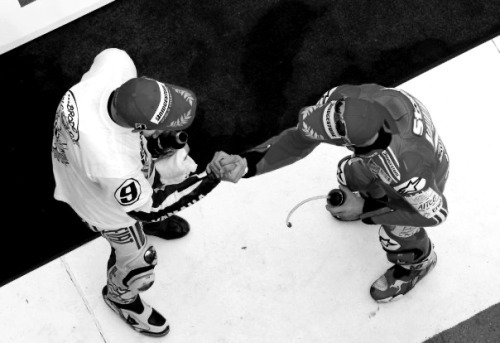
so then. valentino is projected upon, while casey gets the role of the one loathed by the public. written off before he truly got a chance, blamed even when he is blameless. valentino is the inverse - he is uplifted, he inspires emotions in others as has always been his mission statement... that kind of love comes with its own cost, as valentino is well aware. it is also a love that easily turns ugly when directed at valentino's competitors, of which valentino is again aware. to him, this too is part of the natural landscape of sports... nothing unfamiliar to anyone raised within football culture. both of them are aware of the public's fickle nature; both are prepared to treat the crowd as more of a mob. a lot of rgu concerns societal roles, how baked in they are within every facet of society, how immutable they can feel... valentino and casey are both given their parts to play early enough that almost nothing was ever going to be enough to alter those roles during the course of their careers. each perception of them inevitably has been subjected to this filter - the beloved clown prince versus the moaner. in this, as in quite a few other things, valentino and casey neatly find themselves in opposition. even if, of course, casey ended up having to learn something from valentino in the art of entertainment. casey's role in that particular rivalry is as much as anything else that of the reluctant student - both on and off the track. and casey in all his talent is perhaps valentino's very best student... in valentino, he sees the shadow that he must gradually incorporate into himself - the basest of ideals he must both reject and draw from to survive and mature. a coming-of-age story where casey is forced to transform whether he wants to or not
I've been avoiding just regurgitating stuff I've written in the past, but I do think this paragraph from here is pretty relevant:
and valentino isn’t just a foil in the sense that he provides a striking contrast for casey to define himself against - he is also the agent of transformation who forces casey to learn from him, to grow and change himself, as well as a mirror who can throw into sharp relief elements of casey that might have otherwise gone unnoticed. not to get too jungian here, but the analytical psychologists would say that casey is being forced to confront his shadow self, with valentino quite nicely mapping onto a trickster archetype (junk science but can be fun if you don’t take it too seriously). the unconscious elements of casey’s personality he is not entirely at ease with, these strict codes and rules and standards he subjects both himself and the rest of the world to… valentino both acts as an embodiment of the various injustices casey has experienced throughout his life, a living breathing representation of many of the grievances casey has accumulated - and as this discomforting presence that teaches casey things about human nature, including those parts of himself that had existed within casey’s emotional 'blind spot’. valentino exists in such violent opposition to a lot of casey’s most strongly felt ideals that he not only serves as a conveniently malevolent presence to be projected upon at will, but also as this mechanism by which casey is forced to confront the shadow. it’s all over his descriptions of laguna - “valentino showed who he really was”, “I learned a lot about character, I learned a lot about race craft, I learned a lot about what people were capable of”, “I underestimated what people are capable of just to win a race”… valentino deceives, he manipulates, he tricks - but he also serves the function of revealing what was hidden. and on the one hand, it makes casey recommit to his own values, knowing that he would not have acted like valentino did - “in his place I would have apologised”, “I couldn’t have done that overtaking, if I touched someone and moved them I felt guilty. it was the stupid part of my character, but it was what kept me asleep at night”. but on the other hand, it also prompts a transformation within casey - a “change in mindset”, something that “helped me in the following years”, adopt “a different mentality”, that taught him to “be more selfish with my racing”, to “race for myself”. again: “but, after two years of racing with people who don’t worry about you, I’ve learned that I have to do the same.” “people think it was the turning point of the season, but instead it was the turning point of my career, because from that moment I told myself I wouldn’t worry about thinking about others anymore” - he’s very explicit about this, isn’t he? and of course, most memorably: “what happened between me and valentino at laguna 2008 won’t happen again, or if it does, he’ll get it back tenfold”. for all that acting like valentino did would cause casey sleepless nights, if given a do-over then casey believes he would match and surpass valentino’s brutality. if that’s not being brought in touch with your own shadow I don’t know what is
valentino is everything casey would never want to be and never could have been... and yet by the end of the journey, casey has become a little more like him. valentino is both casey's imagined ideal and his imagined monster. neither of them are entirely true or untrue - but both exist in casey's mind as much to fulfil a certain function for him as they are as an 'objective' truth
and even in the unadulterated adoration valentino receives you will find an element of dehumanisation... valentino captures the emotion of the common person, but he himself becomes a little less human in the process. an idol, a god, a monster... his rivals increasingly were drawn from the pool of his own fans, who brought along with them their own conceptions of valentino before they ever even knew him. jorge studied him endlessly, dissected him with his instructor in the dark art of communication, wrote about him in his columns. there must be something strange about competing against those who have analysed your smile, though valentino by then will have gotten used to that level of inescapable scrutiny. then again, of all valentino's rivals, you could say jorge had the most accurate understanding of what he was signing up for... a happy coincidence, perhaps - some of the things jorge wanted out of the rivalry, valentino was more than willing to give. jorge and the others, they saw what they wanted or needed to in valentino... and valentino has enough faces that they could find something to base that perception on. he had the ability to be all of their foils and play that role brilliantly
it is at this point of the post - safe in the knowledge that not one soul is reading what essentially by now amounts to a private journal which happens to theoretically be available online - that it is time to jump off the deep end. let's talk witchcraft
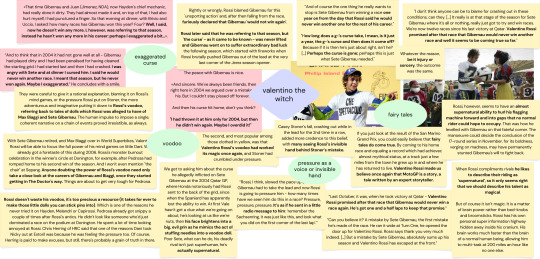
I recently made a post where I laid out my personal general explanation for how valentino keeps creating these like... narrative nexus events, ridiculously dramatic and memorable races that somehow just manage to completely change the vibe of an entire season, rivalry, etc. that was all very much about what valentino was doing in practise. there's real sporting reasons for why his approach to competition also has this particularly pronounced mental effect on rivals. obviously, that stuff is not really in the spirit of this post - I do quite like the stuff I wrote in terms of elaborating how 'valentino the storyteller' functions, but this time round I really am just talking about vibes
the thing about anthy in rgu is that... okay, I know the whole series is a deconstruction of fairy tales, that it's critically engaging with these assigned roles including that of 'witch', that anthy is constantly suffering throughout the story, that she is a victim of this storybook structure. but I can't help it, I do actually love anthy's version of being a witch. I love when she gets to be mean and torments the student council members, I love what she does with mikage, I love the mystique and the shape her 'powers' take and so on. it's a very compelling portrayal of witchcraft in its own right. a lot of anthy's actual witchcraft is focused around appearances, around illusion, around trickery and deceit and manipulation of the mind. her magic in some way 'protects' dios, yes, she saves him from the brink of death - and she does seem to have some more 'offence-based' ability in providing the sword to whoever possesses the rose bride. but even the sword seems to have little actual power in and of itself - saionji outright says that the power of the sword depends on the wielder. utena has to channel dios herself... which at most is only very loosely connected to anthy. she is the sword's host. beyond that, she dabbles in types of transformation... shapeshifting used to turn nanami into a cow, illusion and memory manipulation to make mikage see her as mamiya, transfiguring her own clothes and embellishing the uniform of the current owner of the rose bride in preparation for the duel. additionally, she seems to have some natural affinity for animals, with chu-chu essentially functioning as the witch's familiar. beyond that are the more subtle ways in which anthy works in conjunction with the setting to warp reality. the strangeness of the school and how she plays into its absurdist logic, the way she seems destined to attract hatred upon herself, how she seems to subtly affect and manipulate those around her... she serves as a mirror for the other characters to see certain elements of themselves reflected back, the blank slate to be projected on... her ability to draw out these traits is not clearly supernatural, but is not not that either
the school itself does a lot of work in slowly breaking down its inhabitants, subjecting them to its absurdist logic and making utena ever more accepting of the bizarre events that surround her. the pitch is one of surreal melodrama - so utena may wonder and scoff at the duels and the mirage castle in episode one, but by episode six she does not even blink at a kangaroo with boxing gloves interrupting her conversation. the school destabilises its inhabitants and removes the foundations of their very understanding of reality. knowing what we do of anthy and akio's influence on proceedings within the school, it feels reasonable to treat it as an artificial environment of sorts... the destabilising elements are not a bug, they are a feature. and, well, in the artificiality of the drama it presents, it does bear some superficial similarity with sports - which is all about artificial stakes. nothing about sports is real... the stakes, certainly for the viewer, are essentially disconnected from their material conditions. there is no rational reason to care about sports. motogp takes this one step further by making the trappings of the sport so patently ridiculous, embracing surreal melodrama all the way. a lot of the sport is absurd, from the body horror elements in how it handles injuries to the complicated network of allegiances and animosities that exists between its most high profile participants to its celebrations. while often scoffed at from the outside, or indeed by podcast hosts, motogp's over-the-top silly staged celebrations are part of the sport now, indelibly so. a frequently cited reason for why these celebrations are so unpalatable is in their very artificiality, the theatricality supposedly sapping away the 'true' emotions of the moment - they are accused of inauthenticity. but the inauthenticity... is the point. this is a show. it is theatre. it is entertainment. none of it is 'real'. you can resent your attention being drawn to the props or you can embrace the absurdity. you were always watching a stage
and of course, this is in large part valentino's doing. his fingerprints are all over the sport, but this remains one of his most noticeable impacts... having a bit of a laff as a teenager in the nineties, and now all these years later we've got terminator reenactments that baffle any outsider to the sport. a lot of the traditions of any sport will organically develop over time - but to those baffled outsiders, you would have to explain that this can all essentially be traced back the influence of a single person. valentino was all show, all theatre, all the time. his gift was in making the emotions so earnest that the artificiality got lost in the mix... again, without the emotions, none of this works. valentino's witchcraft is aesthetic as much as anything else - an affinity for illusions and mirages that allowed him to repeatedly take control of the situation. look at how he used his celebrations... in quite straightforwardly practical terms, they were very much part of his arsenal, a manner in which he could psychologically bludgeon the opposition. a way to make the defeat sting more for the opponent, a way of defusing his own past errors, a way of ensuring he alone had possession of the limelight. defeating his opponents by strangling them of oxygen. he has made this level of theatricality more or less the norm within the sport, a mode of engagement that suits him better than anyone else. and look at what he did to his rivals... he drew them into his web, forced them to join him in a world where cursing one of his rivals became an accepted, established sporting narrative. be wary of taking on valentino - he can break his opponents. he will put you under pressure until you crack. and everyone watching is waiting for that moment... if you slip, even just for a moment, everyone might just decide to believe he has worked his black magic on you
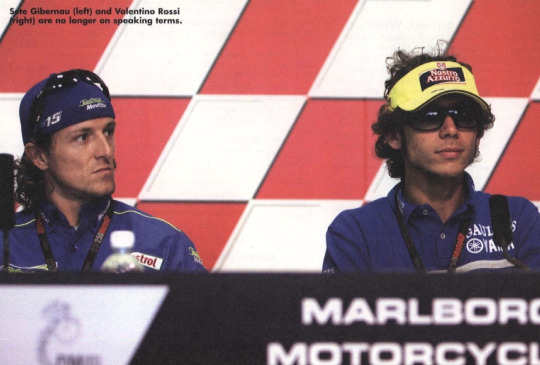
when valentino places his curse on sete, what he is essentially doing is putting him back in his place. sete had been his friend before he was his rival, someone who had trained with him and advised him how to transition to the premier class and had spent holidays with him. and then he became the challenger valentino never should have had. not the ultra-talented wunderkind who set the sport alight with their irrefutable natural skill - no, instead valentino faced an unexpected contender... one who had suddenly emerged on the scene when already a little older and a little wiser. the message valentino received from the press was crystal clear on this front - valentino should not be losing to this man. sete should have been beneath valentino. every defeat was a humiliation, one that called into question valentino's own grit and resolve. why is it that so much of the discourse in that early 2003 season was so concerned with why valentino was faltering, rather than paying credit to the man who was actually beating him? sete was at best a feel-good story... but feel-good stories do not make for worthy challengers. if valentino's later rivalries reflected well on him by allowing him to take on and best the new great hopes of the sport, this rivalry felt for a while like it could only do harm to valentino. sete had risen above his station... affluent and well-connected outside of the sport, born to a prominent family and afforded a good education - within the artificial confines of motorcycling competition he was far beneath valentino in the pecking order. he had become better than he was supposed to have been, he had defied those who had already written the narrative of his career, and he had imposed himself where he had no right to be
is it any surprise, then, that these defeats particularly grated for valentino? why is it that he looks quite so miserable at sachsenring 2003, in a way he does not after any of his other premier class defeats? it was sete specifically he could not stand losing to - in part because he had been told he shouldn't. even pre-qatar 2004, valentino is preemptively gloating at the chance to separate himself once again from sete. "a return to reality that is difficult to accept" he says of sete's dwindling title hopes during the motegi weekend... sete had had the audacity to seriously believe he might be a title contender, and for that valentino is going to punish him. after the events of qatar, all bets are off. while his comment that he was looking for an "excuse" not to talk to sete were made in anger and should perhaps not be taken completely literally, while he does most likely have a genuine grievance when it comes to the events of qatar... once valentino is given his excuse, he can fully devote himself to the task of destroying sete. what he is doing, in essence, is reimposing the status quo of the sport. here stand the talented - over there are their lesser peers... sete had already been assigned a role to play, had rejected the narrative he had been told was his own - but now, the narrative comes crashing back in with a vengeance. the story punishes him brutally for ever believing that he was something he was not. and in the worst indignity of them all, it has since sought to erase him from the tale entirely. valentino's authorial hand once again makes itself known - he, more than anyone else, is enforcing this erasure - but obviously it is worth questioning why everyone else has been so willing to go along with this. they were there, they saw all of this unfold, they at least should know valentino was in genuine jeopardy... the most myopic, miserly, miserable conclusion to draw is that valentino was never truly competitively threatened, that with full benefit of hindsight he was simply never going to lose to one who occupied such an inferior position in the hierarchy that sports logic follows. as depressing as this would be, perhaps it is the correct conclusion to draw. who knows
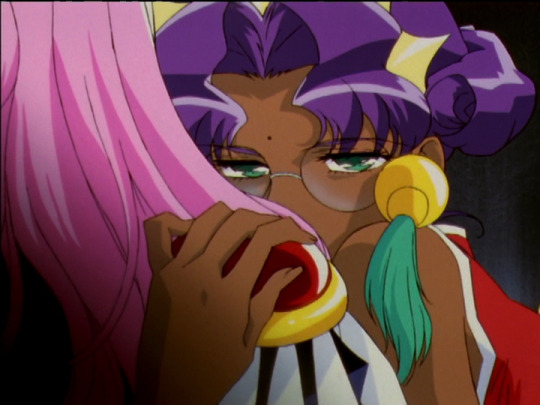
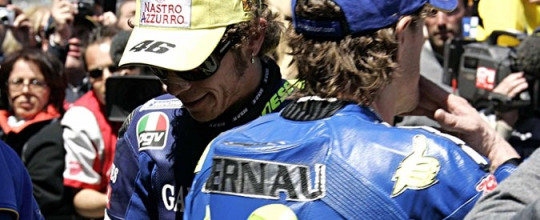
either way, valentino gets his will. jerez 2005 is when he strikes his fatal blow - and it is the moment he completes the punishment of his friend. again, this is reimposing the status quo... it serves as a cruel reminder to sete that he has nothing but defeat coming his way, that he is nothing. the last corner lunge in all its desperation serves to remind sete that valentino will stop at nothing to beat him. valentino would rather crash them both out than see sete win another race. and having the full weight of valentino's ire directed at you tends not to be a pleasant experience. from mid-2003 to 2005, valentino continually reconstituted the reality of the sport... rewriting the rules as he saw fit, deserting the dominant manufacturer on a whim and winning with his new project. deserting his friendship with sete on a whim and changing that story too. but for all these superficial adjustments, there were some laws of sport he was never going to touch. he enforces some of its cruellest edicts in his revenge against sete, destroying sete because he can and retroactively ensuring that sete's existing achievements would not get the respect they deserve. even in his own mind, perhaps most importantly there, valentino has been able to dismiss sete. this is his vengeance... pressure, pressure, pressure, exerted ever more expertly and more viciously off the track and on it to terminally crack sete's confidence. sports is all in the head and valentino ensured that sete would be trapped in his own. at its worst, competing can be a living nightmare. valentino did his best to become monster to the man who had once been his friend
here is the fun in having a witch around, then - this character who subtly exerts control on those around them to torment them. a voice in your head while you are riding, reminding you of the last time you made a mistake. the invisible hand that forces your errors. gags about your rival making dolls of you, carried around to stick pins into. the pernicious ill luck you face, so inescapable that surely it cannot just be coincidence... a malicious influence hanging around the edges of perception, doing the bidding of a witch. and what valentino does to sete benefits him beyond the end of that rivalry by providing him with a reputation of someone who does not just beat opponents, but breaks them. it is a reputation that did much of the legwork for him in his rivalry against casey, generally minimising how much work he had to do himself. little use in going around all day talking about how you might have broken another rival if somebody else is willing to do that for you, right. given casey's own specific neuroses, obviously this just happened to be basically the worst possible torment anyone could have cooked up for him - which was just happy coincidence, albeit of the sort valentino saw an awful lot of over the course of his career. the post-laguna stretch was so horrendous for casey precisely because it appeared to prove everyone's suspicions... which of course to some extent can become a self-fulfilling prophecy. everyone thinking you are broken is more likely to break you. a common trick in the charlatan's repertoire - let the mark prove the magic for you
so there we have the confines of valentino's witchcraft. a certain stylistic sensibility... flash and glamour, the sport's aesthetic ever more loud and colourful. positioning himself as the showman as well as the authorial hand, capable of writing his own fairy tale. an ability to reinvent himself, new eras demarcated with shifts in his own appearance as well as approach. a keen and savvy operator when dealing with the media, happy to slip them a line and waiting for it to bite his opponents. a weaponisation of his persona as the showman, most obviously in his celebrations. a reputation that does much of his work for him. a public that treats him like an idol and a god - surrounded by people who wilfully project onto him. he transforms and he manipulates and he deceives; he tricks his rivals into conversing with a mirage, then punishes them for their folly. slippery and hard to pin down and many things to many people... the sport is always watching you, so you had better watch it back
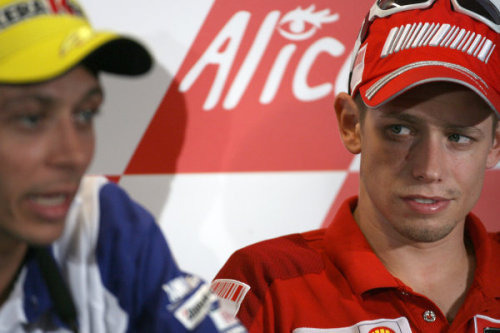
the only rival who ever truly proved capable of beating valentino at his own game was casey - as ever, the best student of the lot. while casey's evolution into a savvy media operator in his own right is interesting, as is valentino's complete and utter disinterest in countering the narrative casey repeatedly has set out in the press, there is a far more obvious moment in which casey's willingness to twist valentino's tools against their maker pays off. it is the moment casey continues to refer back to as often as he can - jerez 2011, when he immortalised a racing incident forevermore with his pithy retort to valentino's apology. casey understands the power of that line and that moment as well as anyone, which is of course why he will never stop talking about it... in some ways, the scene echoes laguna 2008, their other most infamous confrontation. first off, the line itself - "ambition outweighed your talent" quite obviously resembles "let his ambition to win take control over his technique", something casey accused valentino of in the aftermath of laguna. this distinction between ambition and talent, will and skill, mentality and ability... it is a continual theme in the rivalry, reflected both in what they themselves say and what others have written about it. casey calls valentino smart, valentino calls casey talented. they both question whether the other might not be a little lacking in the other dimension. the other key similarity is in how valentino has deliberately ensured casey's comments will be recorded - at laguna 2008, he interrupts casey's tv interview so that camera and microphone will capture him refuse valentino's handshake; at jerez 2011, he is accompanied by cameras to give casey his apology. back then, casey had been operating from a position of weakness, incapable of controlling his temper and biding his time. in the short term, jerez 2011 earns him a fair amount of backlash - but it does not matter. casey has waited for years to get his revenge and valentino's move to ducati would deny him the chance to do so on-track, which casey may secretly have regretted... this would have to be the next best thing. casey perfectly understood the importance of that image and managed to inflict a rare defeat on valentino in his own arena. integrating the shadow within himself, right... he did it on the track, and off it. if valentino is a god within the sport, then casey surely has his own place within the pantheon (x)
he is riding like a devil and is always at the front // he is very, very strong, very young - a great talent who rides without many problems. he is riding like a god! // today he rode like a god and he's a fantastic rival // he rode like a devil so he deserved the championship and he's number one // he rode like a devil and he made great results last year with nothing to lose and he raced all or nothing
valentino is the god of motogp, at times explicitly referred to as such, and casey is the heretic who dares to challenge him and even dares to win. who is resented by many for his accomplishments, all while failing to be quite what the motogp world wants him to be. casey is denying valentino [...] isn’t it just FUN when we’re talking rivalries and narrative foils and all the rest of it to have valentino come along, this bloke who is seen as a god by much of the world of motogp - to have him essentially anoint casey to the pantheon himself in the way he describes casey. 'rarely guilty of making an understatement’ is fair, perhaps, but valentino doesn’t generally talk about his rivals like this. it’s a casey thing! that’s why they’re such great rivals and foils, right - casey’s talent versus valentino’s ambition, this lovely dramatic contrast between two blokes who are so strikingly similar on some dimensions and violently different on others. truly two of the best to ever do it
valentino's last trick is ensuring that he is so difficult to defeat - not just as a rider, but in the totality of his persona - that any attempt to do so will inevitably burn his enemy. none of his major rivals have emerged entirely unscathed from the experience of competing against him. some are quite possibly scarred for life. valentino is the master of the pyrrhic victory... it is possible to beat him, to burn the witch and perhaps even surpass him, but valentino ensures there will always be a bittersweet quality. corrosive like the sun
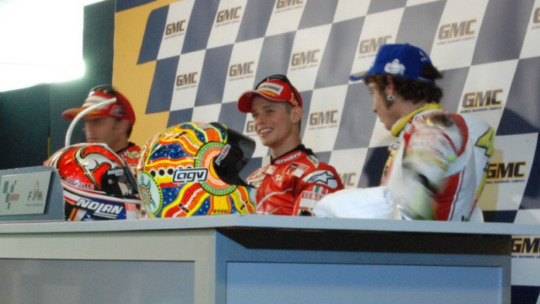
once he has exhausted all his tricks and burned all his bridges, there is no going back for anyone. all this self-mythologisation and mythologisation by others can just about manage to promote him to true mythical status within this artificial world, a world partly of his own design... and as long as this world constitutes the whole world of his rivals too, they can never entirely escape him. casey, with his complex relationship with the entire sport, all his well-documented complaints and grudges and bitterness, is of course the easiest example of this. he sees valentino in so much, the sport is linked so closely to valentino in his mind - and thus valentino is ensured further immortality as casey's shadow. which is something valentino has done with all his rivals... all of their legacies, tied inextricably with his own. a sport you dedicated your life to that still at times feels synonymous with a man you despise
which feels like a good place to wrap this up. as much fun as valentino-the-person can be to engage with, sometimes valentino-the-plot-device is just as much fun, if not more so. the narrative role of the witch is to trick and manipulate reality on the one hand - but on the other it is to reveal what is hidden. to tease out truths and buried emotions from all those around them. valentino perfectly fulfils the role of the entertainer within his sport, ramping up the inauthenticity and artificiality to allow for a true emotional excess - while also being a changeable enough slippery enough character to allow him to fulfil so many different functions over the years. upstart, challenger, king, comeback kid, underdog, fading titan, mentor... he can be any of these and all of these and none of these. his popularity is so enduring and non-questionable that it allows him liberty in some regards, the freedom to transgress in some arenas... the gaze of all the eyes of the world on him might serve to rob him of his personhood, just a little, but obviously it also represents a gift and a strength. there's something just conceptually fun about having a figure capable of bringing out the worst of those around them, revealing their flaws as surely as he does his own, acting as a nailed-on source of narrative tension. one who is dehumanised by the many eyes directed upon him at all times, but twists this in his own favour... one who uses trickery and cons and curses to enact his vengeance. it's quite the feat to be loved as a witch, you do have to say
***
obviously this whole thing was quite a... long and perhaps not particularly coherent examination of just some stuff that's been rattling in my head. as much as sports is fun to discuss as sports, sometimes it's also fun to go full-in on the narrative elements! anyway. I doubt anyone will get this far and this kind of thing generally doesn't leave my notes/brain but. I had fun with it :)
#utena anon come backkkkk to me :( my inbox and indeed my messages are extremely open#//#brr brr#spec tag#clown tag#curse tag#heretic tag#wall tag
12 notes
·
View notes
Note
Is there a Fun Fact for me this Friday?
I didn't see this until Saturday, so this is queued up to be the one Fun Fact answered this week--I am out of town after all. So! Today You Learned about the peryton!

See, the peryton, a 'mythological' creature, a deer with the wings and sometimes rear legs of a bird. It's growing in popularity in fantasy fiction and role-playing games--for instance, they appear in the Fablehaven series, as something the dragons of Wyrmroost prey on, I think?
Here's the interesting thing: they're not actually mythological creatures. While yes, in history, winged deer do appear in heraldry every now and then, the term 'peryton' wasn't historical, and as far as I know there are no stories about them in any tradition of folklore or myth.
So where did this come from? Easy: Jorge Luis Borges, the Argentine writer. In his Book of Imaginary Beings, alongside actual mythical creatures, he put the peryton in there, along with a fake history he claimed he got from a medieval document. According to him, they're native to Atlantis, but were able to escape because they could fly.
Interesting backstory considering he made them up!
So! Perytons! Mythological creatures! Except kinda not. They're still pretty cool, though.
13 notes
·
View notes
Text
A completely unnecessary analysis of the flowers surrounding Bag End: sunflowers, snapdragons, and asters.
I got this idea after reading a ton of adorable Sam and Frodo fanfic involving the language of flowers and getting a little obsessed with floriculture. I went on a hunt to find any flowers that were actually mentioned in the books and found this very small passage in chapter 1 of Fotr, describing the flowers surrounding the outside walls and windows of Bilbo and Frodo’s home. so I took the different meanings and symbolisms of the three flowers mentioned, and found fun ways to relate them to either the story or the characters. Please enjoy this unhinged interpretation that absolutely nobody asked for!!
Starting off with the sunflower! These mean, undying loyalty and adoration. This symbolism originates from the Greek myth of the nymph Clytie, and her unrequited love for the sun god Apollo. When she realized her feelings would never be reciprocated she spent several days not eating or drinking, following the path of Apollo’s sun chariot across the sky, until she eventually turned herself into a sunflower, perpetually facing the direction of the sun and waiting patiently for Apollo to return to her. Alternatively sunflowers can also mean everlasting, specifically everlasting friendship, and obviously joy and happiness. Their symbolism at Bag End is particularly precious with the theory that Sam planted these flowers. I love the idea of him using these to declare his undying devotion to Frodo even if Frodo doesn’t notice it! It’s giving you want me and you just don’t know it yet. But if that’s not your cup of tea, then these could also symbolize devotion to the Baggins’s, Sam’s lasting friendship for both Bilbo and Frodo, or just good vibes. 💖
Next are snapdragons, which I think have the coolest symbolism! They can mean two things, either grace or deception, but the exact meanings are very specific. Snaps can thrive under really harsh conditions, they can grow in cramped rocky areas and survive in subfreezing temperatures, so they specifically symbolize grace under pressure or in difficult situations. And while they do mean deception in the language of flowers, they’re mostly used as an apology flower for deceptive behavior, or used as protections against it. During the medieval period which is roughly the timeline Lotr was set in, these flowers were seen as guardians against evil forces and were typically planted by gates and around wealthy residences like Bag End. I freaking love the idea of these flowers being symbolic of the bravery and perseverance of the Baggins’s, but it might be more likely that either Bilbo or one of the Gamgees knew about their protective qualities and either the gardeners planted them out of reverence, or Bilbo sweetly chose these for Frodo’s protection.
And lastly Asters! These were my personal favorite to research and play around with because they mean so many different things and literally have the perfect backstory. Asters got their name from the Greek word Astrea, which was also the name of the Greek goddess of innocence and justice who created them in myth. The most popular version of this myth is that Astrea was so distraught over the lack of stars in the sky, when her tears fell to earth they created the star shaped aster flowers. Shortly afterwards, she herself fled into the sky and became the constellation of Virgo. Virgo is, of course, Bilbo and Frodo’s star signs, and the Astor is an official September flower. These flowers symbolize faith and valor, but in the language of flowers they symbolize innocent love and undying affection. I am choosing to believe these were planted by Sam on purpose, purely because of their meaning, but there’s one more piece of backstory that literally connects these flowers straight back to him. Asters were also an emblem of Venus, the Roman goddess of love, and her planet is the ruling planet of taurus, which just so happens to be Sam’s star sign! *loses shit*
This was a little longer than I thought it would be, but I hope someone finds this as adorable as I did :-) PS, I don’t actually think Tolkien meant anything buy these super random flowers and same goes for the character of Sam, this was one sentence in the beginning of the book that I took way too far lol! It’s not true and I know I’m reaching, but just let me be delulu 😘😘
11 notes
·
View notes
Note
Forgive me if you’ve already talked about this but if Angus is the ‘Icarus’ of the story does that mean that Icarus would be Ariadne/Theseus, and Helios the Minotaur, trapped in the labyrinth of his own home?
I know your book isn’t an exact retelling of the myth but I was just curious if that parallel was intentional?
It's okay! This is a great question! Its kind of twofold.
On one hand, I enjoy and have seeded the interpretation that Icarus is exclusionary to the mythos and exists as a normal high school kid drawn into it non-consensually. His rejection of all elements of the characterization of the original Icarus and disgust towards the mythologization of himself and their situation is very stark and I'm surprised so many people (largely adults) don't notice it. He rejects it in Luca and Celestina when they act like he's mysterious, he rejects it in Sorrel who praises him for giftedness (citing that he's not talented he just has practice), he rejects it from Helios (even when Helios is saying things like "I was born for you", Icarus's assessment of the situation is that they need each other right now and its more realistic that once they leave their respective traumatic situations, they'll settle into friendship) He is a stark realist and his Dreams are minute and achievable.
But ultimately, I wanted him to be looked at as the Daedalus of the situation, as reflected in the re-written myth at the back of the book. Aside from just rejecting his moniker, Icarus is an extremely careful child. He haunts the narrative with warning. He's doing dangerous things, but he's not reckless, he's careful and is the only one in their situation who is behaving with deliberateness. There is a helplessness to Icarus's situation, being someone under the care of the actual Icarus. How little control he has as a minor and his eventual choice to try his best to flee the narrative. There is mirrored horror in Daedalus turning back to see where his son went and there are feathers on the waves, with Icarus in the hospital understanding that Angus will not change and is about to reap the full criminal impact of the history of his crimes.
The end call that's off page with Mr. Black is also important. Angus and Icarus have been flying together for so long, but this moment where their paths divide is one that Angus experiences alone, and Icarus experiences in Aftermath. Because, as Angus is the Icarus of the story, biting the bullet and just picking up the phone to have a conversation that's been on ice for almost twenty years, is the breaking point where he know his wax is melting and he's starting to lose height. His recklessness has a consequence and he's choosing not to grab onto Daedalus's heel as he tumbles to the waves.
Its not a one to one comparison, but honestly, I'm happy with people thinking either.
Helios as the Minotaur is fun! As he is trapped in the labyrinth of his parents marriage (as represented by his home and the rooms within it, decorated by either his mom or his dad) and also this completely inconceivable backstory between Angus and his own father. That is so above his head that he has no real way of understanding how it plays a part in the darker parts of his own life. Much like the Minotaur lol
10 notes
·
View notes
Text
Okay, so now that I am done with the 7.1 MSQ, the Pandaemonium Epilogue quest, and I finished the FFXI alliance raid quests, I have a lot to say about it all, so I’ll put my comments under the cut below.
MAJOR SPOILERS AHEAD!!! Don’t click unless you’re caught up with the 7.1 MSQ at least!!! 👇👇👇
So let’s get some of the side stuff out of the way first before I dive into the details of the MSQ.
The housing items, omg the housing items are amazing!!! There’s so many that I want for Hali that I know I’ll be broke very soon. RIP Hali’s Gil.
The crafted glam gear looks adorable and so is some of the gear sets from the new 7.1 dungeon. I also NEED all of the weapon design contest funny weapons, but I’ve yet to figure out how to get them.
Next, the Pandaemonium epilogue was so cute, as it’s only one quest long if I remember correctly, and you get a reward that, for many of us, is well worth it at the end. Won’t give it away here but yup I love it.
The FFXI alliance raid… oh my god. I have never played XI so any nostalgia factor is completely lost on me, but the raid itself is really fun, the locations are gorgeous, and god the mechanics are way harder than Myths of the Realm in EW in my opinion. I died so many times… but I still think it was fun! The story is really interesting so far, especially with a certain someone returning and Bakool Ja Ja is still incredibly fun, so I’m looking forward to seeing more in the future, and I’ll be running it every week for gear!
Alright, now let’s get into the MSQ. I’m going to say that overall I enjoyed the 7.1 MSQ even more than 7.0, as the story caught my attention way more than it had in 7.0. At the very least they are giving us some more villains to hate, which is a welcome change, and oh boy am I loving to hate these characters!
But let me back up a bit. I enjoyed that they seem to be balancing out our time spent with Wuk Lamat and allowing us to have some time with others; this time I was really happy that we got to spend some time with Koana. I also enjoyed seeing the progress made in Tuliyollal with helping those who were once Turali get readjusted to life outside the dome again; it was nice to see that being addressed with the support group and the railroad. I’m also happy that we got more backstory on Gulool Ja and his parents, which that will transition into what I really wanted to talk about.
The DUNGEON!!!! HOLY SHIT BALLS!!! 😱
The dungeon was spectacular!! The atmosphere of the fucked up research facility, the zombie researchers, the abominations, and then the tural vidraal final boss… everything was absolutely amazing. The final boss is really difficult at first, but I was thoroughly impressed with it nonetheless. I had a slight panic attack during that fight, but I still loved it overall.
I was also excited to be able to run through the facility and take my time looking over everything at my own pace. It really gave me a mixture of Resident Evil and FFVII vibes, with the Jenova Project in particular coming to mind when examining some of the rooms.
I’m really hoping that this place has more significance than just “Oh this is where Galool Ja’s parents did messed up shit researching feral souls” though. I’m actually hoping that this ties into the greater narrative and the hidden enemy or whatever.
Speaking of Galool Ja’s parents…. Ummmmm… wow…. I never thought that I’d have a hard time deciding who the bigger asshole is, Zoraal Ja or Teeshal Ja… because man, she was a creeper. I know it doesn’t go into a ton of detail on how he was conceived, but it really seemed as though she just created Galool Ja in the lab, you know, as a test tube baby, with how Zoraal Ja reacted to seeing the baby anyway. But ehhhh that’s just my best guess on that. Like I said before, I hope more is revealed with all of this, and it’s connected somehow with the greater threat, but we shall see.
Speaking of the greater narrative, I am equal parts curious, excited, and utterly confused by not only the “fake” Sphene that appeared before the people in Solution Nine and the “real??” Sphene at the very end in the “Meanwhile, in Living Memory…” scene. I am glad that I’m confused at the moment and I haven’t figured out what’s going on yet, yet I’m so damn angry about whoever the hell is controlling the “fake” Sphene. Overall, I had a much bigger and much more positive reaction to all of this than I did in 7.0 with all the Alexandria stuff, so I’m definitely looking forward to more story in 7.2!!
I think if there’s anything I can say that’s not as positive about it all, it would be my personal thoughts on the Alexandrian people. Having both their minds wiped whenever anyone died and having a ready supply of extra souls on tap, both functions made possible by their regulators, the Alexandrians just have no idea how to deal with grief and trauma. And yes, while it’s a very interesting idea to explore, and my science fiction loving brain is eating this stuff up, on the other hand, I am finding it incredibly hard to relate to them in any meaningful way.
Perhaps it’s because I have known both traumatic experiences and death of close relatives and loved ones from an early age in my life, that I look at them and its hard not to laugh at how ridiculous they all look. It’s also really hard to relate to their heavy reliance on their queen, so much so that they have no idea how to grieve her properly or how to handle their affairs without a complete reliance upon her. I am very aware that this might just be a “me” problem and that others may have very different feelings about it all. Nevertheless those are my real thoughts on it, and perhaps I can feel a bit more empathetic towards the Alexandrians in the next patches, but we shall see.
I think that’s all I’ve got for now. If you wish for me to elaborate, or you have a specific question for me about my thoughts on 7.1, please don’t hesitate to send me an ask!! Thank you all for reading!! 💖
9 notes
·
View notes
Text
Pirated the percy jackson series and oh my god it is not that good.
Like I get that Rick doesn't like the movies but does he also not like fun?
There are multiple funny and realistic scenes that are cut. It makes Percy and the gang feel perfect and not like 14 year olds on their first quest.
And the casino scene. Is. Bad.
Because Percy immediately notices that something is up and they leave. Which means the Lotus Casino just sucks at its job. If the kid that's been a demigod for a week immediately knows some things up.
And it's not through a bunch of kids wearing outdated fashion (because that requires a character to not look modern in the mystical hotel that traps you) he just knows immediately (and Luke's backstory is given in this episode. Instead of later when Luke is the traitor. Because putting it there makes too much sense)
It is a running theme that Percy knows everything about every threat immediately. Which is stupid. If there is no unknown threat there is no point.
Myths are built on a threat that you do not understand. Especially Greek myths. And to have every character that encounters a threat to figure it out instantly is bad.
Because there is no tension.
There is no how will they get out? How will they win? Because they already know the exact threat they're facing. They already know what exactly to do to win. It feels cheap.
Now the movies are not the best (I don't think they're like the worst thing to come out of the franchise. I actually enjoy them) but at least they were fun.
The Lotus Casino was fun. Sure our characters were being drugged but at least it was fun. Poker face was playing and you could understand wanting to stay there forever.
But by trying to erase the movies completely and not learn what did and didn't work in them the show suffers.
You know how everyone says those that erase history are doomed to repeat it. Well that's not entirely true. By erasing everything from your failure you may have erased the failures shortcomings but you also erased it's strengths.
I have more fun watching the inaccurate movies than the accurate tv show.
Because the movies weren't trying to be the complete opposite of a perceived failure. They were just being some inaccurate fun.
And I think the tv show could learn from the movies. Instead of pretending the movies never ever mattered.
#pjo tv show#pjo critical#i got off topic do if you want me to explain a specifoc point more just ask
33 notes
·
View notes
Text
*cracks knuckles* It's King time baby– Episode 30
This will be in two parts because I have much to cover. One part will be the backstory segment, and then the other will be the rest of the video.
OKAY PART 1
The opening to this video sets up the later tragedy so well. It introduces Gold, King's son, but we know something is going to happen. it hangs over every little wholesome thing we see.
And in terms of wholesome things, they chose amazing ones to show! We have King reminiscing over a younger Gold, before the Gold of the present gives him a corn dog. They share a cute bonding moment (can you hear my heart cracking) before going to the festival.
(I love the concept of the festival from a world-building perspective. is there a reason there's a festival? is it even a festival? it looks very fun)
Gold is drawn in by a booth advertising a virtual realty experience in the world of Minecraft. He excitedly brings King over, and King signs a waiver. King's body language during this scene is hesitant, and the tone is almost a little eery; there's no one else in the section for the Minecraft experience. They are more-or-less alone.
(I wonder if King thought something felt off. I wonder that made him blame himself even more since he did nothing to stop Gold from entering the experience)
Gold is so excited. The workers at the experience let Gold go in, and he enters. The door locks behind him, and he is integrated into the game. King watches as he happily runs around the game, collecting resources and making tools.
Suddenly an alarm sounds. Something is wrong. On the screen King can see a black void open up in the sky. It rapidly expands and spreads, threatening to swallow Gold whole. Gold runs, before opening the menu and exiting the game.
He bursts from the entrance, but he isn't safe. The void is emerging through the opening, and Gold begins to disintegrate. King bangs on the door; it's locked tight. Not even the workers who run over to help him can get it open.
Gold reaches for his dad, but collapses and is sucked back into the game. A "fatal error" show on the screen. Gold is gone.
King drops to his knees. The workers approach him nervously, and one reaches out to touch his shoulder. King whirls around and grabs them by the throat, slamming them onto the ground. He does the same to the other workers who try to stop him before stopping and staring into the Minecraft experience. (In one of the most beautiful shots I've ever seen, the red glow is so ominous)
Back at his house King is in shambles. He lashes out at a poster he took of the experience, punching the wall as if it were the glass doors separating him from his son. He wilts against the wall for a moment, before getting up with new resolve. He will find a way to destroy Minecraft and avenge his son.
He is obsessed with this goal for an unknown amount of time; it could be months, could stretch into a few years, who knows. he researches everything he could ever find about Minecraft. He learns about its mechanics, its blocks. He learns of the command block, and acquires one from a shady figure in an alley. (such a smart move my dude)
The staff doesn't work. He tries several different versions, but even when he does manage to get it to work he still doesn't quite understand its mechanics. Maybe there was another way.
He delves into Minecraft's myths and mysteries. There he finds a description of the Minecraft Game Icon: "The most powerful item in Minecraft". The location is unknown. He tears the page from the book and walks around town, showing it to people. I honestly don't know what he expected but props to him for showing initiative I guess.
He stops outside a tech store. There, showing on one of the televisions, is a group of young sticks playing with an icon. Playing with it. King now as proof such an item exists, even if he has no idea how to get it. But he has a goal now.
Find those sticks.
He hangs up wanted posters all over town. And by a crazy stoke of fate a purple stick finds them and takes one.
Purple shows up at King's house with the poster and appears to explain the he knows the CG and how to find them. King doesn't seem to respond, or at least respond positively. (King's vibe in that scene was one of "I just woke up and I don't want to talk to people", which... mood, I guess that comes with the depression)
Purple jumps to prove himself, displaying how he is agile and can fight. When that doesn't get a reaction he pulls out his elytra and show off his flight skills instead. Lots of flips. King gestures for him to come inside.
King's house is a mess. Purple looks around a bit, finding a picture of King and Gold. King takes it out of Purple's hands and Purple backs away. They make their way down to the basement, where it is clear King has been working on the parkour trap idea for a very long time. And he has a Nether portal. He lights it up with his staff (which he now knows how to wield) and they enter Minecraft.
In the Nether they find a bastion. They defeat its inhabitants, and King offers them gold in exchange for their allegiance. (I'm pretty sure they might think he's a god of some kind because he can technically create gold from nothing, and remember how he disabled the AI of that one Piglin? Dude's terrifying)
With the Piglins now under his command, King builds himself a throne of quartz and gold. Purple kneels and hands him a golden crown. King takes it and gives Purple a head rub. I'm pretty sure that head rub won him Purple's undying loyalty tbh.
_._._
This section of the episode is so good. It sets up everything we need to know, and portals King perfectly. We can see and understand how he got to this place of extreme grief and obsessive vengeance.
We also see Purple, whose motivations we now understand from the last episode. He seems so upbeat here, so happy to help. It's devastating that he was so willing to betray his new friends for the validation of a father figure. My poor boy.
#THIS POST GOT SO LONG#so sorry about that#there is so much to cover in this episode#Coming Up Next: Another Super Long Post Because Whoo Boy Will There Be A Lot To Talk About Next Time!!#I never get to ramble about these things to anyone irl so this is the result#heheheh no one can stop meeeee#alan becker#animation vs minecraft#rage's ramblings about sticks#animator vs animation
18 notes
·
View notes